Pamela Clare's Blog, page 11
May 7, 2014
Learning to Cope

I’m not sure about you, but I’ve never been very good at waiting when the stakes are high. One thing that made journalism work for me as a career was that everything was happening right then. News breaks, and you respond. A story falls through, so you find another story. A computer breaks down, so you come up with some creative way of getting the paper to press anyway. It’s all action all the time.
Waiting to find out whether the cancer in my left breast has spread and whether I’ll need chemotherapy and for how long quite simply sucks. As of this moment, I have a tentative surgery date for early June — which seems terribly far away. I can’t make it get here any faster, and I have no way of knowing any more about what I’ll be facing until the surgery is completed and I have the full pathology report.
I find myself in the exact circumstances I’ve always hated — one in which I have no control and can take no action. All I can do is pray and wait.
In the past — as recently as the weekend prior to my diagnosis on April 21 — waiting on the cusp of something potentially frightening had a way of ruining my entire day. During the week following the news that I needed to come back because they’d seen something on my mammogram, I felt sick. I couldn’t get my mind off it. I could not escape the fear, some part of me knowing that this was not going to be good.
On April 21, hearing the radiologist say, “It looks like we have an early breast cancer,” made me feel absolutely ill. I cried. I closed my eyes while they did the biopsy. I simply shut down, my entire mind and body rocked by the news that I was now facing a long-term health struggle, one that would change my body and my life forever.
The week that followed involved more dreaded waiting as I carried my cell phone everywhere, anxious to get the pathology report so that I would know whether this was an aggressive cancer or a slow-growing tumor. Fortunately, it turned out to be the latter — estrogen and progesterone positive and HER2 negative.
Then came the week of waiting to see a surgeon and a plastic surgeon, each appointment making the situation I’m facing more real.
And now I’m waiting to have surgery so that we’ll know everything we need to know about the battle ahead of me — whether the cancer is in my lymph nodes, whether the genetic type of tumor requires chemo, whether the surgery went well...
The strange thing is that I have moved from shock and panic to a strange sense of calm. And, no, I haven’t been taking advantage of the state’s legalization of marijuana to achieve this.
Part of it is the fact that I’m getting lots of TLC from my family. My mother has been amazing, cooking meals, doing laundry, letting me live almost like a child in her home and enabling to focus all of my energy on my own situation. My father has listened to me rant, using words he would ordinarily not appreciate, just to comfort me.
My sister arrived last week, and she makes me laugh more than anyone. She has always been my best friend. When I was coping with the aftermath of being sexually assaulted at age 10, crawling in bed with her in the middle of the night made the nightmares go away. She’s just magic that way.
Also, a quiet community of authors, all of whom are either survivors of breast cancer or currently battling breast cancer, have reached out privately to me, enabling me to ask questions and offering me their reassurances. One of my best friends in Denmark had exactly the same kind of tumor a couple of years ago and spent a good hour or so on Skype with me sharing the details of her experience. All of these incredible and strong women have helped me find my way beyond panic to hope.
My family rallied around me and helped me get spring cleaning done inside and outside my house, taking the burden of that work off my shoulders so that I would have one less thing to worry about in the coming weeks. Their support, expressed in sweat and hard work, means so much to me.
My readers have sent dozens of sweet cards wishing me well, some with gift cards to Starbucks or bookmarks or breast cancer bracelets.
My faith community sent me the flowers from the altar from last Sunday’s service and connected me with women in the congregation who are going through the same thing. My priest, Rev. Susan, gave me a chance to vent my anger and frustration.
All of this together gave me hands to hold and an outlet for the initial emotions I felt about this diagnosis, and for that I am so very and eternally grateful.
But something else is happening as well.
All of us have heard how we should accept the things we cannot change. That idea has been expressed in so many different ways through faith, philosophy, slogans, Facebook memes. It comes down to a simple idea: If you can’t control it, don’t worry about it.
My response to that has always been irritation, even anger. As a reporter, I was ready to go to the mat for the sake of an important story. Fight the bastards. Gather the facts. And flip the bad guys the bird by putting all their dirty laundry on Page One. What a rush! As the editor-in-chief, I was the boss. Shit would happen, and I would tell people how to respond. A crisis almost pepped me up, as it gave me a chance to pit my wits against some kind of obstacle while on the clock.
When the Columbine shooting happened, for example, it took me less than five minutes to make all the decisions regarding our coverage and the deployment of reporters and freelancers. Though the situation was horrifying, I was able to control my emotions and respond immediately.
I have simply never accepted that there might be a situation I can’t overcome by being quick on my feet, smart, proactive, and relentless.
But there is no way to win by pitting one’s wits against breast cancer. I cannot outsmart it or assign a team to deal with it so that I can do something else. I cannot make it go away by writing about it. There is evil-doer to expose, no deadline after which the problem will be gone. And the adrenaline rush isn’t fun; it’s terrifying. There’s really nothing for me to do that will change the outcome of my surgery.
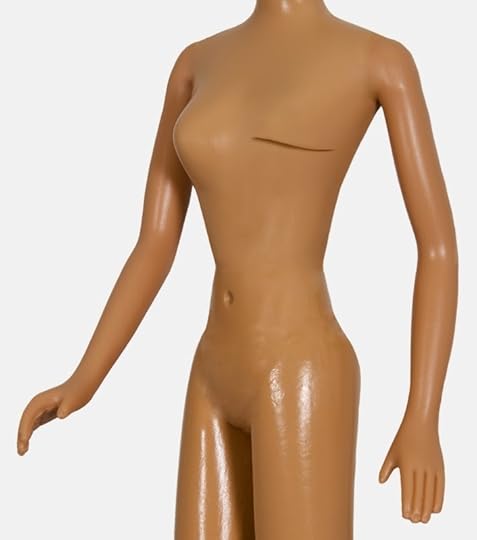
Oh, sure, I can research the hell out of breast cancer and treatments and doctors and procedures. I can (and do) get second opinions. And at the end of the day, my situation hasn’t change one bit. It is what it is.
By all rights, I should be hanging upside down from the ceiling pulling my hair out by now. Uncertainty and helplessness are not the environments in which I thrive. But for the past couple of weeks, I’ve had far more good days than bad ones, far more days when life has seemed more or less normal than days when I’ve been consumed by fear.
I’m astonished at how normal and fun a day can feel even when you know you have cancer.
I guess I’m starting to “get it.” I cannot change the situation I’m in. I can’t outwit the tumor in my breast or bark orders at it or call it out in public and shame it into going away. I can’t worry myself into being well, or make the surgery day come any faster. This is my reality. And I just have to surrender to it and take life one day at a time, enjoying each moment as fully as I can.
If someone had told me on April 21 that this is what I needed to do, I probably would have told them to cram it. But something has shifted profoundly for me in the past ten days or so. I find myself willing to let things go. I call it “taking time off from cancer.” If I don’t have an appointment or anything that I can do that day, I say my morning prayers, let it go, and focus on the day.
It’s not that I have to trick my mind into thinking of other things; I truly do let it go. I didn’t know I was capable of doing that, and knowing that I can enjoy life now, that I can cope and even thrive has opened a world of possibility for happiness that I didn’t realize existed.
That’s not to say I don’t have bad days or bad moments. I definitely do. Also, I haven’t started writing again. But my days are no longer dominated by fear.
If there is anything I could do with my own experience so far it is to make other women less afraid of doing monthly breast exams, getting regular breast exams and mammograms, and being assertive about getting extra screenings if they feel anything might be wrong. Feel you need an extra mammo? Demand it.
But the message of this blog is simply this: Life with cancer can be happy. I never imagined I could be in this situation and yet feel so calm.
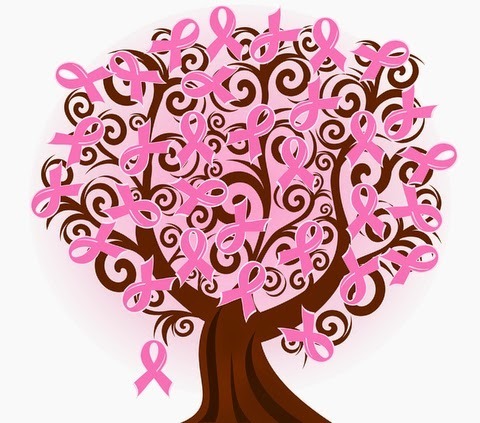
And now because I’ve gotten so many emails, I thought I’d do a quick FAQ about my own situation. (I can’t answer everyone’s emails or Facebook messages, so please post here or on Facebook rather than sending Facebook messages or emails! I can’t read through them all.)
Q: Did you feel a lump?
A: No. I had three breast exams by my doctor in the past 12 months, and she didn’t feel anything abnormal either. The lump, which is roughly 2 cm (an inch) in size, was behind fibrocystic tissue, making it hard to detect. Any time I go to the doctor, I get a breast exam. I figure what the heck, right? It didn’t help me, but it might help someone else.
Q: Do you get regular mammograms?
A: Yes. I’ve always gotten the screenings done when I was supposed to. This time, I delayed it by two months because I was on vacation in Europe. This is a very slow-growing tumor, so the delay will have no impact on the outcome. The surgeon says the tumor was already growing last year when I had my 2013 mammogram but was too small for radiologists to detect. I’ve seen last year’s mammo. There was nothing there last year. This year, a half-circle of white dots mark calcifications in the tumor. Had I felt reassured by my 2013 mammo and skipped this one altogether, I’d be facing a very different situation next year. Moral of that story? DON’T SKIP YOUR MAMMOGRAM!
What you might find out from a mammogram is far less terrifying that what you might miss if you don't get it.
Q: What risk factors did you have?
A: The only risk factor for me was being sedentary and overweight, one of the hazards of being an author. I have no family history of breast cancer. I had my kids in my early 20s. I breastfed for a long time. I don’t smoke and rarely drink. I did not use birth control pills for longer than five years. I’ve never had an abnormal biopsy. I didn’t reach puberty early. There’s no real obvious reason why I have this. My doc said they’ve seen a spike in breast cancer, in part due to better diagnosis, but also because rates are climbing due to environmental contamination by estrogenic carcinogens. (Go online for a list of these chemicals. You’ll find them in skincare products, food packaging, etc.)
Q: What is going to happen to you?
A: I have opted for a mastectomy of my left breast (the one with the tumor) and a preventive mastectomy of my right breast even though I could have a lumpectomy because I want to do all I can to minimize risk of future recurrence. Women who get mastectomies have a slightly smaller chance of having a new cancer in what remains of their breast tissue than women who have lumpectomies. That right there was enough to convince me. Other women make other choices, and I support them in doing that. But this is my body. I need to make my own choice.
During the mastectomy, they’ll check lymph nodes for any cancerous cells. My ultrasound showed normal lymph nodes. All of the blood work I’ve had done indicates that the cancer has not spread. The tumor is small as breast tumors go. The tumor is made of the most treatable kind of cancer. So there are a lot of things that stand in my favor and are very hopeful. We’ll know for certain after the surgery.
Because I haven’t reached menopause and because I’m relatively young, I will almost certainly have to have chemo. They treat breast cancer more aggressively in younger women because of the estrogen in our bodies. But they’ll do a special DNA test on the tumor and more blood tests on me to make the final determination sometime after the surgery.
There is lots of waiting ahead of me. But I have lots of living to do in the meantime.

Thank you to all of you who’ve been so supportive. Your posts, pink ribbons, and virtual bouquets of pink flowers have meant so much to me. And all the thanks in the world to my family for rallying around me.
Published on May 07, 2014 20:15
May 1, 2014
Faith and Cancer

Those of you who are not spiritual might find all this uncomfortable and think I’m crazy. Those of you who are some version of fundamentalist or orthodox might find it offensive. But here goes...
I had a kind of premonition early this year that I would have breast cancer.
If I’d been right on schedule, I’d have gone for a mammogram in February. But I chose not to do that because I had airplane tickets and plans for a great vacation in Europe. Something inside me felt that if I got that mammogram, EuroTrip 14 would be cancelled because I would get bad news.
I prayed a lot before getting the mammogram, asking for normal results. But that’s not how it went. In the first week after my cancer diagnosis, I had a very hard time praying. I wasn’t sure what to pray for, given that I had obviously been ignored. I told my priest, Rev. Susan, that I figured God had felt more in the mood to hit the “Smite” button than answer my prayer. I told my mother that perhaps I'd been a Nazi in my last life or something. I said a lot of things.
I was very angry. I was terrified. I was walking a path I’d never wanted to walk.
Some people told me that God never gives you more than you can handle, but I reject that outright. Despite what I said to my priest about the “Smite” button, I do not believe that God dispenses misery to humankind for kicks or as punishment. God did not give me breast cancer as a trial or test or to pay me back for years of using profanity. I take the story of poor Job as a parable about faith, about how bad times get better. The idea of God making bets with arch-enemy Satan while allowing innocent men and women to be killed and a good man to be tortured to within a breath of his endurance is deeply offensive to me.
That kind of God is not a God of love.
Also, I do believe lots of people endure situations that are, in fact, more than they can handle. Ask the soldier whose PTSD drives him to suicide. Or the incest victim who dies of anorexia. Or the alcoholic meth user whose abusive childhood deprives him of the very strength he needs to rise above addiction.
Saying that we are never given anything more than we can handle is a subtle way of blaming those who cannot rise above their tragedy and anguish. It’s also a way for well-intentioned, caring people to comfort themselves.
I had no real risk factors for breast cancer. There are no obvious reasons why I have it. But God is not the cause of it. And yet God didn’t intervene and prevent this from happening either.
What does that mean? I have no idea.
There are times I’ve been able to see God in my life. Was this the absence of God in my life?
I guess that’s the question I was dealing with in the midst of this terror.
I don’t pretend to have the answers. But I do know God is. How do I know? Ask a Catholic what being “slain in the spirit” means or a Protestant what it means to have a “conversion experience,” because that’s what happened to me one afternoon. It was like thunder inside my heart and mind, and it blew me away. My spiritual life since then has been a clumsy struggle to respond to that one event.
So God Is. And I am because God Is. That’s what I kept repeating in my mind these past couple of weeks when my heart was slamming so hard that I could hear it and my stomach was churning and full of butterflies and I could think or pray nothing else.
With the initial shock behind me and a treatment plan slowly taking shape, I’ve been able to reach out again for God’s loving kindness. And here are my random thoughts, which are, of course, subject to change at any time.
This life is a gift. Life doesn’t belong to me. I have a very short amount of time to walk this earth in this body, and I can control so little of what occurs around me. I can’t even control what happens inside my own body. I hardly have control of my thoughts and certainly not my emotions.
Many things happen in life that are unjust and unfair. They are not God’s doing. But when people rise above those things and treat each other and themselves with compassion, that is the spirit of Love inside them. And God is love.
I’m not saying that God takes them over and makes them behave a certain way like spiritual zombies. I’m saying that they choose to be their God-given higher self. They choose to serve the Spirit. They choose to be the higher human being they were created to be.

That doesn’t mean they’re not afraid. Even Jesus was afraid. As the story goes, he asked his apostles to stay awake with him in Garden of Gethsemane, and they failed him. He even felt despair at the end.
For any woman to be afraid when diagnosed with a terrible disease is to be expected. I am trying to be strong, but I am also going to let myself be human. I have moments where I feel fine, and then I have moments of raw panic, where I can do little more than curl up in bed and cry. But then I get back up again.
What I’m trying to do, what I’m hoping to do, is to lay my fear aside and trust that, even if this doesn’t go the way I want it to go, I will still be okay. This is God’s world, not mine. I didn’t bring myself into it, and I don’t get to decide how I leave it. But I can trust that there are still things for me to do here, still ways my life can count, no matter how things go for me.
And I can trust that God is.
I’ve been sharing my daily experience with this devastating diagnosis on Facebook, hoping to urge women to get mammograms and hoping to demystify breast cancer a bit. In turn, the support from my friends and readers helps me keep going — and I truly have no choice but to keep going.
I’ve had a lot of pretty rotten things happen in my life, and I’ve used them in my writing. I’m sure it will be the same with breast cancer. I’ve always known I came into this world to be a voice for women. And now I will include this experience in that voice.
My surgeon and oncologist assure me that missing that February mammogram has not made my situation worse. I have a slow-growing tumor, and there’s no obvious sign of any spread. And I’m so grateful I have those two months of travel to hold in my heart while I go through this. Those memories will sustain me — as will prayer, God’s love, and the love and support of my family and friends.
Published on May 01, 2014 11:21
April 24, 2014
The "plot twist" I did not want

I never got around to blogging about all the places I visited in Europe or sharing all the wonderful experience I had there. I went over for my 50th birthday, looking to renew connections to all my friends and family in Denmark and hoping to spend a wonderful time with my sons.
I did have a wonderful time. It was beyond my imagining. I came home feeling fully alive for the first time in perhaps a decade. I was full of inspiration and hope and determined to transform the parts of my life I still needed to transform. Before balancing my checkbook, I ran out and bought $300 in art supplies, determined to bring painting and drawing back into my daily life. Committed to being healthier, I also scheduled an appointment for a physical, including a mammogram, blood work, and an ultrasound of my upper abdomen, which often hurts.
The blood work came out better than it has in years, proving that walking everywhere and running up the countless stairs of the French RER and Parisian Metro systems is actually good for you. The ultrasound came back normal, as well. Whew!
But then I got a phone call from a nurse telling me that my mammogram had an “asymmetry” in the left breast that concerned them. I had to go back for more films.
In the week between the phone call and the appointment I prayed a lot. I spent time with people. I tried to distract myself and tell myself that it was nothing. Some 5 to 10 percent of women get called back after having a mammogram, and most don’t have cancer.
My mother came with me to the appointment. I was shown the area of concern on the mammogram — a little half-circle of white dots that could represent calcifications or cancer. Yikes. They took more films. And when the nurse came back she was no longer looking me in the eye.
“The radiologist wants one more image,” she said, her smile tight.
And I knew.
I went straight from there to ultrasound, where the tech marked a dark area on the screen, and then told me the radiologist would be in to see me.
I felt absolutely sick and shaky and angry. I had such a terrible feeling that this was it. And it was.
The radiologist sat down and said, “It looks like we have a small, stage one breast cancer.”
There were no visible abnormalities in my lymph nodes, he said, and that was good news.
My mind glommed the words “small” and “stage one,” but my thoughts turned to white noise at “breast cancer.” I started crying, while he began outlining what came next. Biopsy. Pathology report. Meet with a surgeon. Possibly just a lumpectomy with radition. Maybe not even chemo.
I managed to send a quick email to my sister and a text to BFF Jenn LeBlanc, who responded with “WHAT????”
I kept my eyes closed throughout the biopsy — injection of numbing medication, insertion of biopsy needle, three clicks for three tissue samples, placement of a metal clip to mark the biopsy site. It hurt more than I was prepared for, in part because lidocaine doesn’t work well on me. I was unable to stop my tears, those words whirling around in my mind. And then it was over.
I had to drive myself and my mother back to my place. I was stunned and felt almost numb. And then the waiting began.
I got the official pathology report the next day: a 2cm mass that was invasive ductal carcinoma and in situ ductal carcinoma that was estrogen and progesterone positive. It was, the nurse told me, the kind of breast cancer you want to have IF you have to have breast cancer.
But the nurse also said they wouldn't know what stage the cancer was at until they had more information. IF the mass is mostly the invasive form of ductal carcinoma, it will probably be considered stage 2, so probably chemo. If the mass is a mix of both invasive and in situ, then it could even be stage 0 or stage 1. If there are microscopic cancer cells in my lymph nodes, it would be an early stage 3 and definitely chemo. At stage 2, my chances of survival are about 85 percent. At stage 3, they drop to 65 percent. The nurse said she thought it looked like a probably stage 2 cancer that has been there for a while.
I asked how something like this could be so advanced when I’d had a mammo a year ago and three breast exams since, and she said she thought it was probably there on my last mammo but not yet discernible. The moral to that story? I don’t know. I did everything I was supposed to do, and here I am.
Now I’m waiting again — waiting to see the surgeon and the plastic surgeon, waiting to get the official pathology report that will tell me what kind of a battle I have in store for me, waiting for surgery and reconstruction, waiting to see how much of the life I rediscovered in Denmark and Paris will still be mine.
They’ve done studies to show that attitude does not affect the outcome of cancer treatment. People who tell me that “attitude is half the battle” apparently haven’t read those studies. Even so, I want to have as good an attitude as possible. I’ve survived childhood sexual assault, two men breaking into my apartment in the middle of the night with switch blades, death threats, two stalkers, a serious mountain-climbing accident, a major operation on my cervical spine. I can survive this, right?
I hope so. I pray so.
But there’s no glossing over the shock, the rage, the grief, and the fear. It’s real. So many people say, “Keep your chin up!” But I’m going to let myself feel whatever I feel, even if it makes other people uncomfortable.
My sister, who lives in Stockholm, is flying home this weekend to be with me for seven weeks. She is my best friend, and no one makes me laugh the way she does. My mother is an RN, so she’ll be able to help take care of me. My friends, readers and family have rallied around me. And that is a huge blessing.
Benjamin, my younger son, will be home from Paris on May 8, and having him home will be a huge help, too.
In the meantime, I’m trying to remember the joys of visiting my friends, the happiness of eating pizza on the banks of the Seine, the bliss of dining in the Eiffel Tower with my two sons.
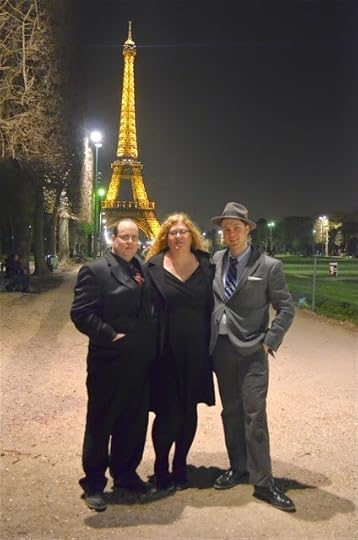
Thank God I took that trip, because the more than 2,000 photos I took, the conversations I had, the places I visited — they will live in my soul throughout this time, as will your kind words and good wishes.
But FUCK! Cancer sucks!
Published on April 24, 2014 16:06
April 7, 2014
Jenn LeBlanc’s ABSOLUTE SURRENDER is out! Giveaway plus excerpt
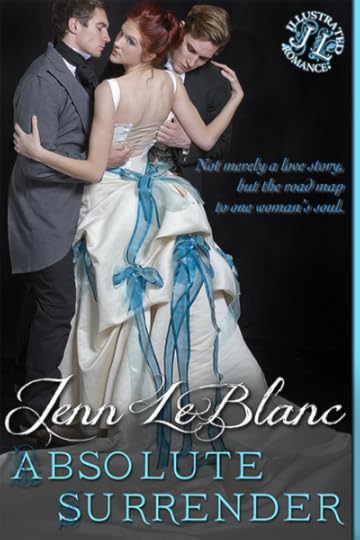
It’s out!
Absolute Surrender , Jenn LeBlanc’s second novel, is officially released today! I feel a special attachment to this story because I watched the creative process unfold, watched Jenn as the story took over and began to go in directions she hadn’t planned (as stories often do). She wrote part of it in a hotel room we shared on a writing retreat, and we wrote together a few times in coffee shops.
The story is not like most romances you’ve read. For starters, it’s illustrated. Yes, it has photographs. Sexy photographs. Jenn is an award-winning journalist, in addition to being a talented author, and she put those photographic talents to use shooting photos of key scenes in the story just as she did for The Rake and the Recluse , her first book, the original Illustrated Romance.™
More than that, the story itself defies conventions. As you can see from the luscious cover (which features the sexy cast you’ll see inside), there are two heroes. Yes, it’s a menáge story. But it’s not erotica. It’s romance.
If that’s not enough, the heroine is afflicted by a condition that in her time in history could easily have landed her in that dread institution Bedlam. Fortunately for her, she holds the hearts of two men who will stop at nothing to win her — and to protect her secret.
Here’s the book’s blurb:
Happiness was always too much for Lady Amelia to hope for.
Now all she expects is to secure her future and marry Charles, Duke of Castleberry, as arranged. But Amelia has a dangerous secret that could not only destroy her in Charles's eyes and the eyes of society, but could also very well condemn her to Bedlam.
Baron Endsleigh, Amelia’s oldest friend, has other ideas. Ender has loved Amelia all his life. He knows her secrets, and they don’t frighten him. He plans to come between Amelia and Charles in any way he can to prevent the marriage and finally claim Amelia for his own. Though her father forbade the match years ago, Ender is determined to have her as his wife and nothing can stop him. Not even a duke as powerful as Castleberry.
That duke has hated Baron Endsleigh and wanted Amelia for, what seems to him, forever. Charles will stop at nothing to make her his, and his alone, even if that means destroying the one thing he knows she loves most in this world—Endsleigh.
Will Amelia be able to choose when one man speaks to her head and the other her heart?
None of them will find happiness until they all three learn to embrace absolute surrender.
You can get the book online at Amazon, Barnes & Noble, iBooks, and Kobo. Or head to Jenn’s website to buy it in trade paperback.
To celebrate the book’s release — I feel attached to this book baby because I watched it be born — I’m giving away an ebook copy of the story in the winner’s ereader format of choice. All you have to do to be entered into the drawing is share the news about the book’s release on Facebook or Twitter and tell me where you posted in the comments on this blog BEFORE MIDNIGHT on April 11. I’ll announce a winner Saturday morning.
PLEASE remember to leave some way for me to reach you! You can't win a prize if I can’t get hold of you!
Also, Jenn is giving away a Nook and a $25 B&N gift card to one randomly chosen reader who reviews ABSOLUTE SURRENDER. Enter your review links here:
http://www.romancewrangler.com/2014/04/absolutesurrender-reviewraffle-jennleblanc.html
And now as an extra treat, here’s an excerpt from the novel courtesy of the lovely author.
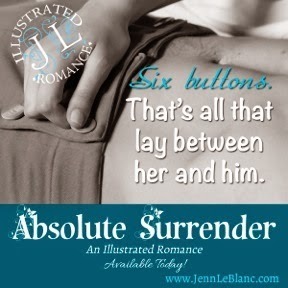
CHAPTER ONE1881London, England
Amelia stood. It was the simplest explanation, really. She did nothing else. Her back straight, her hands held gently—not too tight—just below her waist. Her reticule dangled from one wrist, resting just behind her hands. Her skirt did not sway—as she did not twitch.She blinked. The room was full. Nobody looked her way. She corrected the angle of her chin because it had been too severe. She lowered her chin slightly and tilted her head gently to the left to balance the flowers in her hair because her girl had angled them to the right. She smiled gently—there’s that word again—and shook her head. Gently, she thought. Gentlygentlygently. Amelia’s shoulders drooped at the thought, so she lifted and rolled them back gently—no, unnoticeably. Yes, I rolled them unnoticeably, not gently. Well…gently as well, but more unnoticeably than gently. Or perhaps so gently as to be unnoticed? Perhaps that’s it. She twitched. Amelia wished she knew what was wrong with her. If she could give a name to this malady, perhaps it would lose its power over her. That’s a ridiculous thought. The fact was, to give it a name would be to give it more power—to the people who would diagnose her, to those who would judge her, to the doctors, physicians and others who would determine she was unhealthy, unworthy…unwell. Power to those who would then control her future, and that of her entire family with her. Giving a name to her illness was an impossibility. She had to remain hidden.“Amelia.” Her name rolled across her senses like a heavy fog. He should not be using my common name. I am not common. He is not common. It is not done. What if...what if someone hears?“You,” she whispered, and Amelia’s eyes darted to and fro to ensure their conversation was private as he reached for her hand. “Endsleigh,” she said just a bit louder to deflect any complaints that she’d not responded to his greeting. That would be improper, unheard of. A terrible cut. Amelia looked down. Hugh had her hand, and her heart skipped a beat as her breath increased as if to make up for it. It was her right hand that he held, as is proper, and her reticule hung straight down. It did not catch on her gloved hand or her gown. She’d chosen this particular reticule because once she’d chosen one with cute little baubles and shiny beads and the beads and baubles had snagged her gown and—“Might I have the honor of this dance, my lady?” Hugh interrupted the train wreck of her thoughts.Amelia’s eyes widened as she shook her head quickly to bring herself back to the ballroom, to the man, to the hand on her hand—certainly for an inappropriate amount of time by now. But his hand was warm and as he tightened his grip...she could breathe.Hugh waited more patiently than he ought. He was regal in his black and white, his broad shoulders enhanced by the stark lines. Amelia took another breath. It was a concerted effort until—cinnamon and rich cigar, perhaps a hint of brandy—the knot in her belly loosened just a touch. She looked up to the all-too-familiar whiskey-colored eyes and forced a smile. “Yes, my lord, yes. The honor.” Amelia’s hand slipped from his, and her breath caught. Her eyes drifted as she checked the ballroom to see who was watching, but the answer was more simple than “who.” The answer was everyone, and she knew it before she looked, as well as she knew the chill on her skin was caused by the trickle of sweat rolling slowly down her spine, pausing every so often like a tease as the bead of sweat rounded a small bone then continued on its merry way. She looked past him to see that the eyes of the ton were on her, but were not yet narrowed.Hugh took her hand, this time her left, which was good, because her left hand was rather cold and the other was a bit warm now. The warmth of his hand on her hand—or rather my hand in his warm hand—called her back to the ballroom. “Bollocks.” Amelia’s eyes went wide as she heard the word come from her mouth so softly she could only hope it made it just as far as her own ears. But when she heard Hugh clear his throat—more loudly than was seemly—she knew that was not to be. He smiled at her gently—yes, gently, it had to be gently—as he turned her and rested his hand, his other hand—that first warm hand—on her back. Very low on her back. The heat sank through the layers of her gown and stays and underthings and straight through her skin to her soul. Breathe. As much as her pulse raced, her body softened, sinking into the safety of his embrace. Warmth. Security. It rankled at times that her body calmed to him even when her mind wished to revolt. If she could have been constrained beyond the boundaries of her corset, she might have been okay—but that was not within the realm of possibility here in this room. Amelia shivered. Logically, she knew she wasn’t cold, because the room was brimming with bodies. Bodies with eyes and opinions and all of them on me. Breathe. Damn you, she thought, then twitched and sent the thought from her head. She glanced up from below her eyelashes to see if he’d noticed, and he had—of course he had. How could he not, after all? His hands are on me—they are ON me. Breathe. Damn me! She twitched again and his fingers tensed as his hands relaxed. Odd that—that his hand could attempt to let go as his fingers tensed to...to what? She knew she shouldn’t be seen dancing with him. Not tonight, of all nights, because Charles was here. Somewhere. She needed to get away, before Charles saw her dancing with Hugh. She looked up again, and her eyes went wide as they caught Hugh’s. Then his eyes narrowed. Oh…oh no.#Hugh knew without doubt she was preparing to bolt like a spring lamb—awkwardly and without proper balance—and yet he was not prepared to let her get out of this as easily as with an inopportune and well-placed twitch. She was not going to run from the room. For one, he was bigger than she. Hugh relaxed incrementally, lulling her, letting her believe he was unaware of her intention. Damn me. His grip tightened, and he pulled her toward him through the corner—a warning of sorts.“Amelia...” he managed through a clenched jaw. What he wished to say was, Do not make me regret this. But that would have been too harsh, too much for her delicate state to handle at the moment. They sailed down the far side of the ballroom, his arms so tense he knew they would cramp that night. Hugh worked toward relaxing his features—at the very least. Because were this to be effective, he had to appear happy to be pulling her through the turns. Hugh had to give her the restraint she required, without providing a show for the ton gossips to flourish on. Damn me twice. Why? Hugh watched the emotions fade and pulse across her features like so many birds flocking from a predator. She twitched. Damn me twofold. He stumbled. God in heaven. The song ended. Praise be. Hugh tightened his hand on hers—we are not yet finished here—then turned them toward the balcony bordering the ballroom over the gardens. Hugh shook his head to stay her and moved her hand to his elbow but did not release his grip. “You’ve no idea the effect you have, do you?” Amelia said nearly sotto voce, her smile solidly in place. “You’ve no idea the power you wield so easily.”Hugh grunted, then checked to make sure the sound was not so loud as to draw more attention, and politely raised his hand to clear his throat. Again. Certainly tomorrow he would receive all manner of gifts and cards to usher a speedy recovery from whatever malady they believed him to have—if they only knew.In fact, he was aware of his “power,” as she chose to call it. But his heart rent to see her in these situations, where she could so easily be ruined for all the world. It was a very precarious position. In the wrong hands, she could easily end up in Bedlam, never to return to the world. Her mother didn’t understand, and her father…well. He believed the duke was either entirely too ill to notice much beyond himself, or much too calculating to care what would happen to his daughter, who was currently charged with securing her own future and that of her mother. Hugh thought it terribly cruel, but it was the way of the world. There was nothing to be done about it. Her illness was not compatible with the pressure of the ton. If only to satisfy her, he kicked up a smile on one side and knew the minute she saw it—because she twitched.#The strange thing was that no thought had come before the twitch, as was common. Hugh’s hand tightened on hers as he handed her through the narrow doorway to the balcony, then followed without letting go. If she could just breathe. Damn me twice. But his hands are on me. On me, touching me, on me. Her arm jerked and managed to dislodge him, and she turned, her eyes wide. This was her chance to run. She shifted left, only to find the outside wall of the ballroom, and when she looked right, the high balustrade blocked her, the rest of the space taken by that giant ominous beast of a man who insisted on rescuing her. Damn him again. She huffed and stomped her foot. “Must you be so pervasive? Must you be so insistent? And why?” she whispered viciously to the floor before he could answer, as her eyes shifted around the balcony. She knew he smiled. Damn him twice. She turned away from him toward the gardens, watching the moonlight paint the ground with patterns from the oldest trees in the county. She’d no idea how long she stood there before the air shifted behind her, and his hand brushed her neck. “Amelia.” The anger left her then like a muddied body diving into a clear blue lake—a cleansing. She closed her eyes. “Hugh.” But his name sounded more like “you” on a breath. She absorbed the calming effect of his very presence. Why do I fight this? “Yes, Amelia mine, none other than I. I only wish to help. You can put an end to my incessant pestering with one word. Should you choose to.”Amelia could feel the words as he spoke against her neck, then the absence of heat when he stepped back. When she turned, he was gone, as though he’d never been there. Perhaps just a memory. You.A powerful sob threatened to rend her stays, and she squeezed herself tightly as though to prevent herself from falling into a million tiny pieces on the balcony. The truth was, she couldn’t give him the word he wanted. She loved him, true, but her father would never agree to a match with a mere baron, particularly a baron with no income to speak of—no matter her dire circumstance. “Ma Belle!” her mother shrilled. “You should not be out here alone.” Amelia turned to see her overbright mother traipsing toward her with the air of grace and the intent of mastery. No wonder Hugh had disappeared so quickly. “Yes, Mother.” Improper, improper, improper. How many noticed, how many wondered, how many remarked that he left me here?“Back inside now,” her mother singsonged with saccharine sweetness in her fading French accent. “They’re waiting for you to return. Where is that smile?” Amelia looked down and pulled from the depths of her toes the most brilliant smile possible, then strode lightly back toward the ballroom.#Hugh watched as Amelia stepped through the narrow door, and her very skin reacted, tightening as though she’d walked through a cloud. He saw her joints stiffen slightly, her fingers curl around her reticule, her chin rise just a touch. His head moved back and forth, not enough for a shake but plenty enough to show discontent. Hugh could see her awareness of him ease her, relax the muscles between the blades of her shoulders. She dropped them slightly and allowed herself to float across the room, away from him and toward the man who would be her husband. Damn me forever.He turned to leave and nearly ran down a young lady. “Pardon me—”“No, my lord, I’m entirely at fault,” the girl said. She couldn’t have been more than eighteen and in her first, possibly second, season. He noticed a woman watching them to his left. The Countess Rigsby. Hugh was never one for the young chits put out every year because he preferred women with some experience, some…seasoning. He closed his eyes and groaned inwardly so as not to further fluster the child before him. He took her hand, as she’d been placed in his path, and bowed over it. “The Lord Endsleigh, at your service.” She curtsied. “Thank you, my lord, I am Miss Rigsby,” she replied with a shy smile. He released her hand and took a step back. He considered her. As the charge of the Countess Rigsby, this could be nothing but trouble, particularly as it seemed she wasn’t merely a charge, but a relation. Lady Rigsby was a gossip of the worst sort and tended to trap gentlemen into marriages for her daughters, nieces—anyone put in her charge. And many girls had been placed in her care for the season, because she was ever so successful. Hugh found it the worst sort of irony that her family tended to produce naught but girls, and by the lot of them as well. “Miss…Maitland Rigsby?” he asked carefully. Her eyes widened, and she nodded stiffly. He closed his eyes momentarily to consider his next step, because he knew, now, who she was—and just how delicate. He determined the best course of action was to remove himself, as expediently as possible.“It has been delightful to make your acquaintance. However, I was just on my way—”“Why, Lord Endsleigh, I wasn’t aware you’d been made known to my niece,” Lady Rigsby said from behind him. Her tenor rankled, and he squared his shoulders.“We had not, previously, been introduced, no, but we managed well enough after I nearly tripped over her,” he said, perhaps not as politely as he should have, as Lady Rigsby rounded him to stand next to the girl. She shied, and his heart sank. Hugh wasn’t sure whether it was a game meant to pull at his honor, or whether the girl was as much a victim of her aunt as the lady obviously hoped he would be. “She’s a delightful young lady, however. You should be proud,” Hugh said more politely. He was rather proud at just how politely, considering. “Well, perhaps a dance? Miss Rigsby is quite popular this evening, but I’m sure she has one dance available…for you.” Lady Rigsby’s smile was toxic as it sank past his guard. Hugh was not about to be trapped, but he didn’t wish to damage this girl in public with a refusal. He also knew the kind of gossip this woman could start, and he certainly didn’t need an enemy in her, particularly with Amelia in such a precarious position. A fact he was certain the lady was full aware of. Hugh nodded stiffly as he watched Amelia remove from the ballroom on the arm of her duke. If only he’d been paying more attention, he could easily have avoided this and been gone by now. Instead, he took Miss Rigsby’s hand and led her to the dance floor.#Amelia knew the moment Hugh quit watching because her skin tightened. This is not going to end well. She closed her eyes but for a moment, then lifted her chin defiantly to greet her intended. She could not give a thought to her friend, the boy she grew up with, the man who would forever hold her secrets. The sole light in her darkness.It was wholly inappropriate, a man other than her husband privy to her innermost thoughts. Her body—no, but that’s not what theirs was about, was it? Was it? Was it? Amelia closed her eyes. She needed to concentrate and, as if to remind her, she received a sharp jab to the rib.“Amelia Marie!” her mother whispered. The woman’s face did not shift, as though no word had been spoken. Her mother didn’t seem to understand that her idea of handling the “situation” was about the least helpful thing of all. Amelia widened her eyes to fend off the tears, and when they glistened, she hoped Charles would think it from happiness. She saw him then, through the crowd, speaking with the inimitable Duke of Pembroke-by-the-Sea. Her father. If he’d not been born a duke, we might have been happy, Amelia thought. Amelia shook off that thought as her mother clucked her tongue. She’d not seen Charles in nearly a year, but it seemed that this had been the year when everything had changed about him. He was more than recognizable, even though he was no longer the shy boy she remembered from their youth. Charles turned toward her, his blue eyes searching the room, she knew for her. When he found her, his eyes smiled. Remarkable, that, as his mouth never moved. A full head taller than the whole of the ballroom, Charles was not merely a presence now, but a reckoning. He’d grown into the gangly limbs that seemed to be more of a hindrance than help when trying to keep up with her and Hugh at Pembroke. Charles’s appearance seemed at odds with the overly agreeable personality she remembered, and yet she could tell by the look in his eyes now that to misjudge him would mean a quick end.Jackson and Endsleigh. Jacks and Ender. Charles and Hugh. Hugh had always been the light to her darkness, even outwardly, Hugh was the light and Charles the dark. Charles’s liquid brown eyes, Hugh’s bright as the sea. Charles’s deep, thick hair, and Hugh’s longer sun-kissed blonde. It was nearly humorous, the differences between the two. She always wanted to reach first for Charles’s smooth hair, but she simply could not, of course. She felt the want in the tingle in her fingers, an itch she could not quite scratch. She wanted to touch, to feel, to explore Charles. Whereas Hugh, she wanted to laugh with, chase, sink into. Her father took her hand, and the contact startled her. She hadn’t realized she was already here in the circle, because her mind, as it did, had wandered. She looked down to her father and softened instantly. He seemed so small in his wheelchair, a rug across his knees to prevent a chill to his worn bones. His eyebrows pinched ever so slightly. “My dear, might I present the Duke of Castleberry. Of course you know of him.” He turned to Charles, eyebrows raised with a smile. And of course she did, of course she knew him. Or, more specifically, knew of him, because she didn’t know this Charles, the one who now towered over her, the one who seemed to look straight through her. But she wanted to. This night had been planned, set up and determined for years now, and all that time she had done nothing but look forward to the reality of it. Now that it was upon her, she was frightened. Charles nodded easily, his eyes never shifting from her. “My lady, it’s an honor.” Amelia’s heart trembled at the deep baritone of his voice—something she didn’t remember—and she brought her hand to him slowly. Charles took that hand and bowed over it quickly. Her other hand pressed to her belly, attempting to constrain the loose feeling that once again threatened to spill. “Your Grace.” She smiled when the title sounded strange on her tongue. He’d grown into, and inherited, his title, but all she could see was Jacks, the awkward boy who’d followed her around during those young summers. “I’m certain the honor is mine,” she added as joyfully and as full of smiles as she could muster, curtsying slowly, gracefully, carefully. “I was sorry to hear of your mother.” From the corner of her eye, she saw her own mother’s eyes widen and her smile freeze.Charles released Amelia’s hand and stepped back. As was proper. Not because of her statement, she was sure. He could not be seen to be standing too closely, that was all. Charles was nothing if not full of graciousness and propriety.“Thank you.” His voice was nearly a whisper. The strain of music picked up yet again, and her mother bumped her elbow. “Your Grace, I believe my daughter has been saving this next dance for you.” Amelia thought her mother’s smile was bound to cleave her face clean in two, rather saw it happening, and Amelia’s eyes strained as she stared, expectantly, for the first crack. Charles turned to her mother quickly, drawing all attention with him, as Earth to the sun, his smile tight. If for no other reason, Amelia decided then, she could love him because he measured the intent of her mother rather quickly.“Perhaps some refreshment and a turn around the room, my lady?” Charles turned back to her, bringing her gaze with him. “I find I’m not much for dancing this evening.”“By all means, Your Grace, as you please.” She smiled as she hazarded a glance at her mother—who was actively suppressing a frown. Because, of course, a dance with a duke—and not just any duke but the Duke of Castleberry—would solidify her position. Not a soul would dare speak out about her after that—but a turn around the ballroom would have to do...for now.#Beyond being taken with his future bride—if he could call her that—he was absolutely intrigued. Charles knew beyond reason that if he were to wed her, his life would be more interesting. Charles remembered all too well the girl he first met so many years ago. Full of spit and vinegar and laughter. He could not quite reconcile that with the woman she’d grown into, the one the ladies of the ton whispered of behind their fans. But that was of little concern to him. Ton gossip was old hat, something he’d never bothered with. Charles could see the movements, the odd-placed tics, and could not quite figure why she shivered often, but her actions called to an extreme sense of protection. Stunning as she was, he knew she believed herself to be unworthy of the attentions paid and, in some sense, she was. The only true attention received from the ton was a great disdain for her awkwardness and a jealousy that, due to her position, they could not, under any circumstance, call attention to it. Instead, they waited, they stared, they laughed privately, and they said to themselves what not a single one of them dared to utter aloud—not even to their closest confidants—but they all knew: She was strange. Odd. Different. Regardless of her delicate nose, her bow-shaped mouth, and her viridescent eyes. Irrelevant that she had the most vibrant smile and impossibly bright and luminescent hair that he wanted spilling across his hands. Inconsequential that he had been in want of her since the first moment he’d drawn breath in her presence more than ten years past—beautiful, exciting, laughing and playful. Pointless that he saw these things above all else. Because he knew that she could not yet trust him. Not a stone’s throw, not a toe. She trusted Ender. That much was obvious from the dance they’d already shared tonight. That much was obvious from the summers he’d spent attempting to keep pace with them. That much was obvious from the times Ender had been allowed in her presence—and Charles had not.That much was obvious from the paste smile she had carefully set upon her lips now. Charles shifted uncomfortably.“Your Grace, are you well?” she asked quietly, so no one would hear. She might make the perfect duchess at that. She was so very aware of her surroundings and propriety, always watching, always aware, always a paradigm. Charles frowned, and her hand tensed against his arm, and he wondered what all this caution cost her. “I have always been well when with you. It’s been so very long since we’ve had a chance to speak, and this is not the time nor place for great discussions, is it? Yet there are so many great discussions I wish to have with you,” Charles said. They passed the Duke and Duchess of Roxleigh, and he nodded in deference and received a welcoming smile from Her Grace. They were so different from the general ton, it gave him hope for the possibilities it presented. Roxleigh answered to no one but the queen. Amelia shivered, recapturing his attention instantly, and he schooled his reaction. Ever wary in public he must be with this masterful beauty. Ever concerned that his reaction would call her out. Charles’s position being what it was, if he were to respond badly, the ton would follow without heed. He would be the gate to which the flood would flow, and he felt that certain pressure keenly on his shoulders. He didn’t wish to ruin her, regardless the outcome of their suit. He cared for her, whatever that meant. Well, if he was being honest with himself, what it was was an insuppressible want of her…but that he’d wanted for so long, he believed he might have a genuine care for her as well. Charles turned for the balcony. “Perhaps some air.”“As you please,” she said.Charles followed, properly keeping well in sight of the ballroom, then stayed himself when she released him, walking toward the balustrade. “Endsleigh,” was all he said. Charles couldn’t help himself. He watched as she controlled her reactions incrementally, like a sudden freeze, starting with her ears and traveling down. He saw every muscle stop, coming to attention. It was a rather beautiful dance beneath her skin and caused his fingers to itch, the physical manifestation of a wish to touch. “Endsleigh,” she replied with a catch in her voice. “My oldest friend.”“Dearest?” he asked, wanting to know, truly. “Perhaps.” She turned toward the sleeping gardens, resting her gloved hands on the marble barrier. “Out there, at the far side of England, away from society, the only friends we have are those born to us.” She smiled back at him, over her shoulder.“I imagine. And beyond that?” he replied, perhaps hopefully, needing to know how close they truly were. He had a deep need to posses her body, certainly, though more than that he wasn’t sure he was capable of. Regardless, if she were his, he would expect every bit of her to belong to him, without exception. Body and soul. “Beyond that, there can be nothing,” she said simply. She lifted one shoulder, a concession, yet not enough to allay his fears. “He’s always been allowed in your life, while I have not been. Until now,” Charles said. “All true, and yet—”“And yet?” he asked. “And yet…” Amelia’s voice faded as she turned, and he saw in her eyes the request…no, the defiant demand that he quit this line.For a man to sigh called thoughts of weakness, for men were never to question their thoughts, their wishes. But sigh he did, and he put his whole heart into it.“As you please,” he responded. Her perfect smile returned. Charles was taken away at how well she did that, effected that persona. Created that incredible wash of calm while he could feel, even at this distance, that she was falling apart from the inside. Now that he looked closely he could see those little shivers, jerks, and ticks that never quite went away, were never quite hidden.They both looked out over the gardens. Shoulder to shoulder—she with her hands held perfectly in front of her, he with his clasped tightly behind his back—as the moonlight drifted down upon them like a spotlight in the vast darkness. Charles was not quite as good at schooling his physical features. But then he never had cause to be. He was not nearly as practiced with controlling something so seemingly uncontrollable as she. His control at this point was simply his nature. All emotion had been schooled out of him as unacceptable, and truth be told, he’d never been witness to, or party to, anything like love. Though he thought it must be kin to joy…and that he had witnessed. In her. Charles shook his head and wished...what did he wish? He wished he knew what it was she needed to keep herself together.“Amelia, I love…I love—”Charles stopped abruptly when her eyes widened. His father had always told him that women wanted to hear they were loved, that he should wield those three words like a weapon.“I love…pudding.” What the hell? But when she laughed in answer to the statement…he realized he would have done it again for that moment. Pudding, for fuck’s sake. He wished he knew what it would take to bring that joyful girl from the sea back to him in a more permanent fashion.Endsleigh. Like an unwelcome voice in his head, the name intruded. Endsleigh. To banish Ender from thought would be his greatest wish, but Ender’s effect on her could not be banished. Charles had watched that dance. He’d seen her standing. Just standing. Attempting to simply stand. Then Ender was there, and she had spiraled up and then back, like a top would. Tightened then released, all that difficulty gone. There was something more between them. Charles had always known that, but what he could not understand was why. When they were younger, Ender had been allowed to be there with her, no matter what. Whenever it seemed she was acting out of sorts, they had removed Charles and let Ender stay. This was without a doubt a level of jealousy he had no wish to control. And yet…and yet, to have that same power for her—but he feared that level of concern came from a level of connection that was beyond his ability. Charles shifted again, looked at the leather toe of his shoe as he tapped it quietly, once, twice, a third time. Once they wed, her friendship with Ender would be officially at an end, and all this maundering would have no consequence. She would be forced to his confidence. What would have consequence was if she were unsuitable. Charles knew she had this magic inside her. To find that again…no. He wanted her. She was the only person he’d met in his life who had been so open, so free. Everyone else in his life spoke to the Duke of Castleberry, but she always spoke to Jacks, and he wanted her to speak to Charles. She was never put off by his title, didn’t want him for it. Somehow, she saw the boy and the man. That intrigued him. “It is odd, is it not? The last time we spoke, you were merely Amelia, and I was merely Jacks,” he said wistfully. She smiled then, and it was genuine, and he could not help but return it with the knowledge that that girl, the one from before, was still in there. Charles took her hand and smoothed a circle into her palm with his thumb, dropping her mouth open slightly until he could see the pink of her tongue.“Mon Dieu,” he whispered on a breath. Her jaw snapped shut. “Malheureusement.” he said. Charles swallowed, his mouth suddenly dry, his tongue swollen inside. “Pardon me.” He cleared his throat and dropped her hand. “I believe I’ve had quite enough of this function. I shall return you to...to your—” Charles coughed in an attempt to vanquish the image of that perfect pink tongue from his mind. It didn’t work, so he closed his eyes as he continued. “Your family. Perhaps I could call on the morrow to take you for a ride in my carriage? I hear the Royal Gardens are beautiful at the moment,” he said distractedly. “Something to be seen. Perhaps then we could attempt the first of many great discussions.”“As you please,” she whispered. If only...he thought. Charles reached for her hand carefully, then, quite without his permission, his hand landed gently on her shoulder and dragged slowly down her bare skin to the top of her glove, catching on the edge, then continuing until he had her hand. “And what would you wish, Amelia?” He was rewarded with another perfect view of that pink tongue as her mouth dropped open to answer him, but all he was given was a quick breath. He placed her hand on his arm, and her other hand pushed at her belly, as though she would be ill. “Do you need a moment?” Amelia shook her head. “No, thank you, I simply need to…” She looked up into his eyes and seemed to press that hand harder into her stomach. Her eyes showed pain, and he was truly at a loss as how to proceed. “Amelia, if I have offended—”She shook her head adamantly. “Please do call on the morrow. For tonight, I feel I’m overtired. The trip from Pembroke...” She waved her free hand in a circle, as if to say etc....Charles nodded, but knew an excuse when he heard one. Tonight was merely a beginning, the first opening of the window. He held her hand to his arm and brought her through the crowd, willing some of his strength to her. He thought she needed it much more than he at the moment. All too aware of her physical proximity, he led her through the jostling throng to her waiting mother. He handed her off and turned to the duke. This man he needed to watch. Charles’s own father had told him to be wary of Pembroke but never did elaborate as to why. Charles knew peers used different tactics to attempt to control those around them—it was one of the most important lessons from his father. Control was important, lack of such could destroy a dynasty. As such, whatever control Pembroke had, whatever tactics he used to maintain it Charles would need to determine as they moved forward.“Pembroke, with your leave I would very much like to call upon Lady Amelia on the morrow.” “By all means, sir. By all means. We shall arrange to have a chaperone availed to you,” her father replied.Charles turned to Amelia and took her hand once again. He bowed over it stiffly, nodded to her mother and took his leave.#It was then she breathed. “I do hope you did not ruin this,” her mother mumbled through a stiff grin.Amelia’s hands tensed, one on the other. “I’m quite sure nothing is ruined, Your Grace. You heard yourself he’s to call tomorrow. As for now, I’m to Pembroke House. I see no further use for me here.”“Now, my dear,” her father started, “you should not manage your mother so. You know she only wishes the best for you.”“By all means necessary, only the very best,” Amelia said a bit too loudly and with an irrepressible smile.Amelia turned and made her way to the front of the house. So very close now, within reach, a stone’s throw, so simple. Her arms snaked around her middle. Safety beyond those two great doors and then home to peace, within and without. Amelia’s heart raced her feet to the threshold. Away from here, away from these people, away from everything she hated—everything she was born to be. Everything. This was everything to everyone. Everyone but her. Her everything had already quit the ball, as she did now.
Author Site: http://jennleblanc.comFacebook: https://www.facebook.com/illustratedromanceTwitter: https://twitter.com/jennleblancIllustrated Romance: http://StudioSmexy.com/Facebook: http://Facebook.com/studiosmexy Twitter: http://twitter.com/StudioSmexy
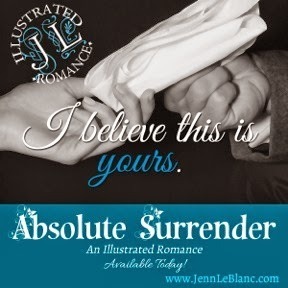
Comment below for your chance to win!
Published on April 07, 2014 23:00
March 6, 2014
Where American Soldiers Rest In Peace — and Why They Fought

I’m going to tell you a story that starts with a pair of new shoes, continues with a cemetery, and ends at the top of the world.
It started when I realized I needed a new pair of shoes if I were going to trek all over the World War I battlefields of France with Benjamin. I have no feeling in my feet and lower legs thanks to a spinal cord injury, and more than once I’ve walked huge, bleeding blisters onto my feet. While covering the Democratic National Convention in 2008, I walked off my pinkie toenail on my left foot, removing the shoe to find blood and no toenail. (Yes, you my cringe now, but I didn’t feel it.) I couldn’t very well expect to go all-terrain without a sturdy pair of shoes that wouldn’t hurt me.
I paid a visit to Boulder Running Company. They cater to serious runners and athletes, the sort of person endemic to Boulder County. I used to be both and now am neither. However, the people there are experts at fitting shoes to feet. I spent about an hour there one night talking with a man who found the perfect pair of shoes for me, a pair of Keen hikers that look like ordinary shoes. But I digress...
While I was talking with him, I explained where I was going and why. I explained Benjamin’s lifelong interest in the French role in World War I. Then the shoe guy said, “If you’re going to Verdun, you should visit the Meuse-Argonne American Cemetery. My brother is the superintendent and lives there. It’s the biggest American cemetery in Europe.”
“Bigger than the cemetery at Normandy?” I asked.
“Yes,” he said. “Some 14,000 American soldiers are buried there, mostly those killed in the Meuse-Argonne offensive in 1918.”

Fast forward several weeks, and Benjamin and I found ourselves with an expert tour guide who didn’t want to take us where we most wanted to go — Fort Douaument — but who had plans of his own. I had shared with Benjamin my story about the shoe salesman, but he said he thought the cemetery was too far north for us. Mr. Radet, our tour guide, apparently didn’t think so.
And so we found ourselves on American soil — in France.
It’s hard to describe the impact of seeing 14,000 marble crosses and stars of David lined up in neat rows. It puts an immediate lump in the throat. It is impossible as an American not to want to go to these men, and so we found ourselves walking among the headstones, reading the names and the states of those who gave their lives in an effort to help the French push the Germans out of France.
So many of those buried here lie beneath marble markers that say only, “American Soldier.” The nature of warfare during World War I — big shell bombardments, flame throwers, trenches that collapsed — means that remains were often very hard to identify. I found myself touching every headstone I passed where no name was written. But on the marble monument beyond the cemetery is a list of every slain soldier whose remains were not found. If only the grave markers could be matched to those names...
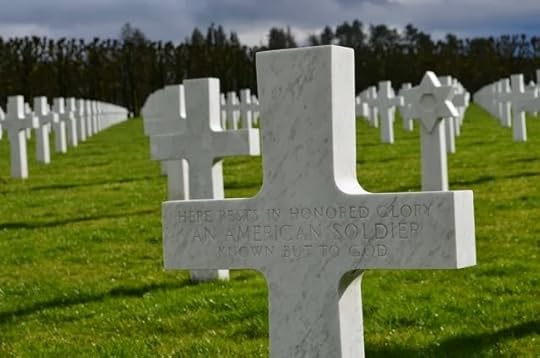
We saw so many men from Illinois, New York, Wisconsin, and Ohio. Only one of the stones we found read, “Colorado.” Benjy and I both said a quiet hello to our fellow Coloradan and moved on.
As a rule, visiting cemeteries doesn’t make me cry. I find it interesting to read headstones in historical cemeteries. But war cemeteries are different. These men did not die natural deaths; instead, they died in fear and terror in the midst of a horrific conflict the likes of which I pray the world never sees again. They left home, their parents and siblings and wives and children waving farewell, and they never made it home again.
I found myself wishing I had 14,000 roses or 14,000 paper poppies. But instead, I walked by these silent markers to the dead, touching as many as I could.
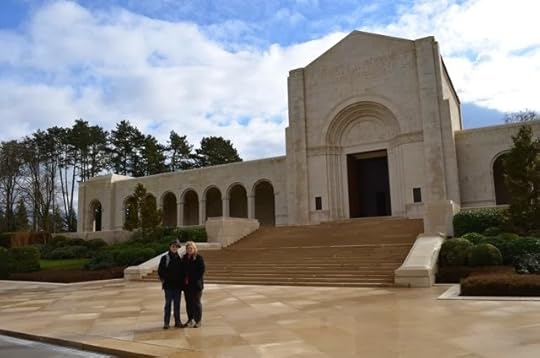
M. Radet took a photo of Benjamin and I in front of the chapel and monument for the cemetery. We went inside and signed the guestbook, both Benjamin and I wishing we had time to stay and pray but not knowing the other was thinking the same thing. Instead, we both said silent prayers.
Now, in the back of my mind I remembered the shoe salesman and his superintendent brother. The superintendent’s house and office stood across a gently sloping hillside from the chapel. But what exactly would I say to the man?
“Hi! My name is Pamela. I write books. Your brother sold me these shoes.”
Then I learned from M. Radet that he had a friend who worked at the superintendent’s office, and so across we went and up the hill — only to discover that neither the superintendent nor M. Radet’s friend were there. The superintendent’s assistant, a friendly Frenchman, gave me a copy of the superintendent’s card and took down a note from me when he heard I was from Boulder. Then M. Radet, the assistant and Benjamin proceeded to discuss World War I at length while I stood there nodding. And the assistant came to understand what I mean when I say I understand French but don’t speak it.
From there, we continued on to the site of Montfaucon. Montfaucon was a town once upon a time. Unfortunately for its residents, it was built on a hilltop. The invading Germans attacked the town early in the war, bombing and pillaging it. Montfaucon was utterly destroyed, including its very old cathedral.
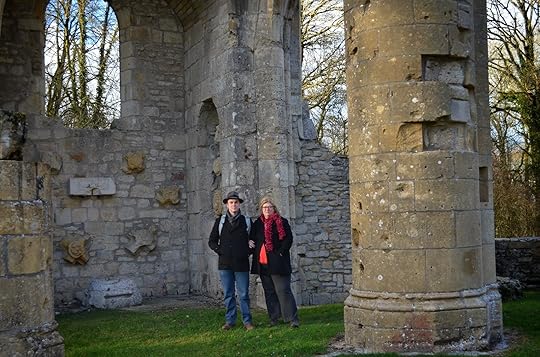
Today, Montfaucon stands in ruins, the bombed out cathedral surrounded by German bunkers and the sites of former homes. Amid the crumbling columns of the church stands what’s left of a German lookout. Deliberately built among the ruins to disguise its presence, it gave them a view of the valley below, offering them a strategic advantage.
The war raged on. The Battle of Verdun started in 1916 across the valley. It ground to a near standstill as the British and French tried to punch a hole in German lines at The Somme. The war continued into 1917 and 1918. And then the Americans came.
Fighting side by side with the French, American soldiers drove the Germans out of the Meuse-Argonne area that they had occupied since the beginning of the war, but at a very high cost. Flame throwers, mustard gas, shells, machine gun fire — American and French soldiers faced it together and died together on French soil.
When the battle was over and the war was won, the French gave a piece of the land American boys had died for to the United States. That land is now the Meuse-Argonne Cemetery.
They also allowed the U.S. government to erect a monument at the site of Montfaucon, a town that will never be rebuilt, in honor of the shared victory.

We strolled through the ruins of the church and the town, looked at the German bunkers, and then went to see the monument. It towers over the landscape giving visitors willing to climb the stairs a view the German attackers would literally have killed for.
Mr. Radet and I chose not to climb the stairs. I didn’t want to fall. But Benjamin climbed to the top in under three minutes, impressing Mr. Radet. While Benjamin snapped up some amazing photos of the countryside, including one that includes the Ossuary at Douaumont if magnified, I discovered another fabulous use for a monument like this: acoustics.
I started singing some Loreena McKennitt tunes, which made Benjamin believe some kind of sound system was playing church music. Wish I had recorded that!
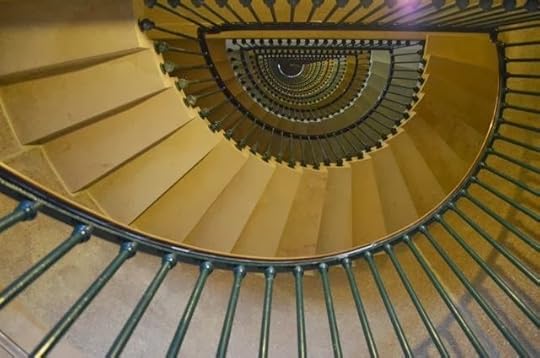
And so in a single afternoon we saw the ruins of Montfaucon and the land for which the French and Americans (and the British) fought — and the resting places of those who died for this landscape.
May they rest forever in peace!

Published on March 06, 2014 08:27
February 25, 2014
Verdun Battlefield Tour, Day Two

Benjamin and I woke up at 6 AM on Feb. 21, 2014. We a little more than an hour away from the exact moment 98 years ago when the Germans launched their surprise offensive in an effort to bypass the fortifications surrounding Verdun and claim the city. We showered, had breakfast, and then Benjamin went to buy flowers.
Mr. Radet met us at about 9:40 and took us where we wanted to go — Bois des Caures.
BOIS DES CAURES

Col. Emile Driant was there with his men on Feb. 21, 1916. In Dec. 1915, he wrote a letter calling for greater preparedness along the battle lines north-northeast of Verdun, which had been deadlocked and quiet for some time but which he feared would be the site of a major German offensive. He openly criticized the decision of his superiors to draw men, ordnance, and weapons away from the region for other areas. He wrote, quite prophetically, that he believed the time would come when soldiers there would find themselves fighting for their lives, some cut off from the rest of the French army and forced to fight by whatever means they could find to hold their ground. The letter got him into hot water, but he was absolutely right. And the men who got cut off and had to fight with every means available to them turned out to be his own.
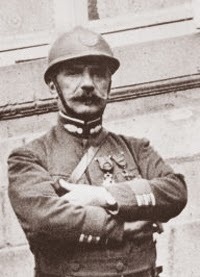
At 6:58 AM on Feb. 21, Germany started the Battle of Verdun by launching what was at that time the biggest bombardment in human history. For the next 10 hours, they fired 808 guns (canons) as quickly as they could, dropping a million shells on the lines at Bois des Caures, hoping to pulverize the French forces entrenched there so that their army of 80,000 could march into Verdun and claim an important strategic location.
Commanding from a concrete bunker (above, still intact), Driant ordered his men to take cover and stand their ground no matter what. Hunkered down in trenches and hidden in the abris (small dugouts in trenches), his force of 1,200 men waited for the bombardment to end. Some were entombed when abris and trenches collapsed. Others were killed by the explosions.
When the bombardment ended, he and his men emerged to fight, using whatever weapons they had. A functioning rifle. A broken rifle. A bayonet.
Surprised to find resistance, the Germans bombed again.
Driant and his men emerged to fight again.
Again the Germans bombarded them, and again they emerged to fight, their number decreasing rapidly. But they had consigned themselves to fight for as long as they could, no matter what their losses.
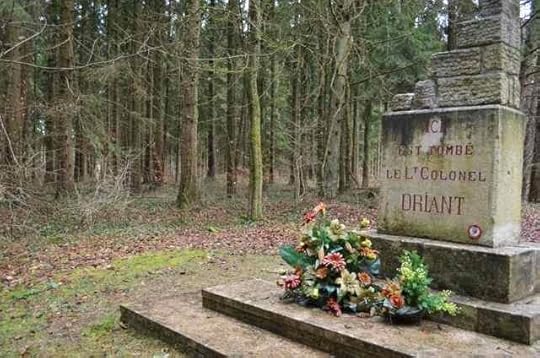
By the early afternoon of Feb. 22, lines to the left and right of Durant and his men had broken, and most of his men were dead. He and his surviving chasseurs were at risk of being outflanked.
Realizing he had no choice, he ordered his men to fall back. He then turned to help a wounded soldier — and was shot dead on the spot by a German bullet.
Of the 1,200 men who fought under his command, only 47 returned to Verdun. But those soldiers bought something precious for France with their blood, giving the French command, taken by surprise despite Driant’s warning, time to mount a defense. Had they buckled or run, the Battle of Verdun might have had a very different outcome.
Benjamin and I both wanted to visit Driant’s grave. The Germans buried him near the spot where he was killed. Later, the French exhumed his remains and buried him beneath a monument erected in his honor within view of the place where he died. Some of this men, their identities unknown, are buried with him, and the spot where he was killed is marked with a commemorative stone.
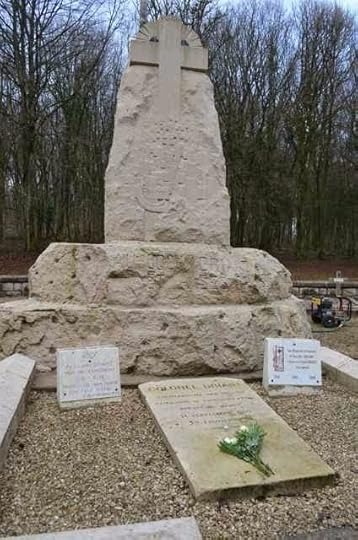
We walked along a trail through Bois des Caures (the Caures Woods, as it is often translated to in English, or Forest of Hazelnut Trees in the local dialect), all of this on our minds. Rain had turned shell craters into pools, and moss covered the tall straight trunks of the trees. It was quiet, so still, so very different from that morning of deafening explosions, flames, and burning metal 98 years ago.
I had expected to see lots of people there, but we came across only one other couple — an older man and woman making this same pilgrimage. We visited the place where Driant was shot down first. Plastic flowers decorate the memorial of the first hero of Verdun, looking shabby after who knows how long. I said a prayer, a bit embarrassed that I couldn’t keep myself from crying in front of our guide. Benjamin stood beside me, and I knew he was fighting tears, too.
From there, we walked to the sight of his grave, a tall white marker over a marble slab engraved with his name and commemorative words. Together, we laid a bouquet of white roses on the marble, then stood for a moment in silence. I think both of us would have liked to stay there a while longer, but Mr. Radet was moving and urged us to follow.

We walked along a faint trail that crossed repeatedly over the remains of trenches and abris to the concrete bunker where Driant took shelter during the initial bombardment and from which he commanded his men. Covered in moss, it looked like some kind of ancient ruin, except that it is more or less intact. The ceiling on one side is bowed down from a shell strike, but the rest of it stands strong.
The French who remember World War I and Verdun revere this place. A barrier of concrete pylons is build around it, their tops adorned with the fleur de lis. Someone had lit candles and placed them in the lookout windows and on the overhangs that shelter the bunker’s doors.
We went inside and stood there in silence, both of us astonished even to be there. I didn’t know the place still existed.
I touched my hand to the cold concrete and tried to imagine.
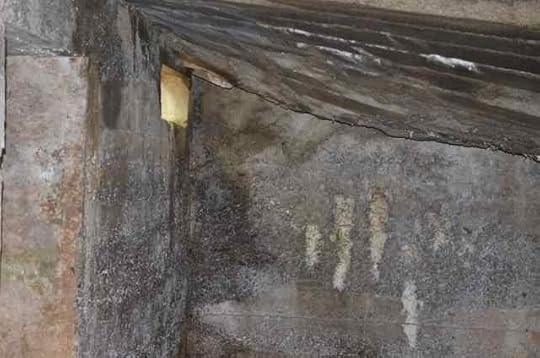
“Ninety-eight years ago right now,” I whispered to myself, thinking of Driant, his prediction, and his courage and that of his men.
Only the sound of birdsong answered.
CÔTE 304 & LA CÔTE DU MORT-HOMME
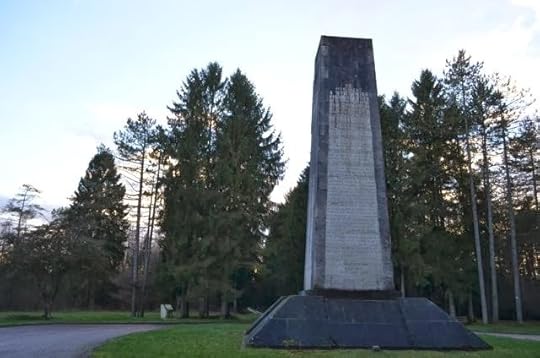
This is a story of two hills — one with no name that was given a number and one that had a name that became only too prophetic: Hill 304 and Dead Man’s Hill.
After the Germans tried to break through lines on the right bank of the Meuse River but had been slowed and lost their momentum, they tried to break through on the left bank of the river in hopes of taking out the French supply lines and capturing Verdun at least.

After months of trying, the Germans finally reached the crest of these two hills, where they came face to face with French lines. French determination, however, prevented them every from reaching the top and taking the hills. I can’t think of any other way to say it than this: The battle cry of Verdun — “They shall not pass!” — was in the heart of every man who fought, was injured, or gave his life on those hills, with the French doing all they could to hold onto their homeland.
We paid our respects to the two memorials, first at Côte 304, where one wife had added a private memorial to her husband, and then on Mort-Homme, which has not only a grisly memorial that celebrates the French units who won the battle, but also a memorial to those who died.

The victory memorial features a man who is partially a skeleton holding a flag, the words “They Did Not Pass” carved below it together with the names of the French regiments that fought there. It is a passionate monument, graphic and powerful, that honors the victorious dead.
Mr. Radet led us through the forest toward a marker that had a photo of what the area had looked like after the battle. You’d swear that you were looking at a photo of the moon’s surface—not a tree in sight, nothing but shell pits and lines that were trenches.
The French government estimates that some 10,000 bodies remain undiscovered and buried on Mort Homme alone. Knowing that makes one watch where one steps. How can it be anything other than sacred ground when so many men are buried there?

As we said our farewells to the place, the sun set through the trees, turning the sky pink. It all seemed so peaceful, and yet there is pain in these places. Each and every hollow created by a shell explosion is a testament to that fact.
Mr. Radet led us on another adventure, but I’m saving that for another post, focusing on the Verdun battlefields in this post.
FORT DE DOUAUMONT

Had the French paid more attention to men like Col. Driant, they might never have lost Fort Douaument. It wasn’t taken in a fierce battle, though it eventually became the site of more than once brutal conflict. The Germans took Fort Douaumont because when they arrived they found the door open and almost no one home.
We visited Douaumont on Saturday in a freezing downpour thanks to Stef Desprez, a personal friend whom I finally got to meet in person for the first time. She was kind enough to take us there, as our guide had been less than enthusiastic about visiting the site.
Benjamin had been to Douaument before and acted as our guide, leading us around the fort’s massive exterior and narrating for us the details of how the Germans captured it. As we walked along, bits of brick and mortar and twisted steel reached up out of the ground at us, “pigtails” that used to hold barbed wire in evidence everywhere, making it clear that the fort’s slopes and top used to be covered with the stuff.
The biggest fort in the area, Douaument had been built to safely harbor 800 men. When the Germans arrived to attack the place on Feb. 25, only four days after launching their offensive, they found no one in the counterscarp galleries. They walked in, strode unchallenged along a hallway, and found only 20 French soldiers inside.
Oops.
The French had lost faith in the big forts—the wrong lesson at the wrong time. Had they all been properly garrisoned and armed to capacity, Verdun would have been a very different battle. Once the Germans took possession of Douaument, they had a base where their soldiers could take shelter and a great view of the surrounding battlefield.

They could not use Douaument as a position from which to fire on Verdun because the fort’s guns didn’t face that way. (A smart feature. Don’t let the enemy aim at your cities with your own forts.) So instead they used it to store supplies, including shells, ordnance, powder, food, and a place to treat the wounded and give weary soldiers a place to rest.
Benjamin had emailed me after visiting Douaument, saying that the place gave him an overwhelming sense of dread. I could imagine that, considering the number of dead soldiers entombed inside. But as we entered, I wasn’t hit with any sense foreboding. Apart from its constant dripping ceilings and stalagmites, it seemed to differ from Fort Vaux only in the fact that it ENORMOUS.

We walked along the front hallway, the inside of subterranean French forts now very familiar to me. Ah, yes, collapsible benches. And wiring for telegraph and telephone. Powder magazines. Barracks with steel bunks. Rows of latrines that I wouldn’t use unless I had no choice. Ventilation ducts. Water tanks.
Most of this we had to imagine, using the iron bolts still in the brick to see where these structures had stood. The fort has not been restored like Falouse.
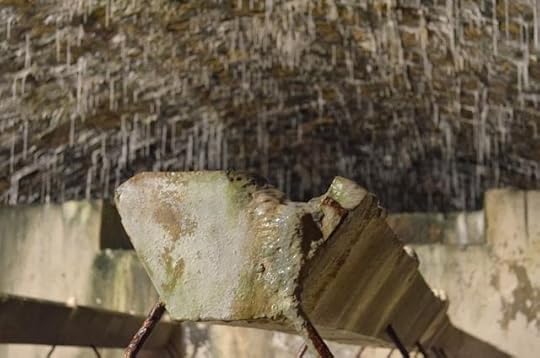
Did I mention stalagmites? They were everywhere, poking down from the ceiling like creepy, pale fingers.
We passed a room where a handful of French soldiers were killed and entombed when a German 420mm shell hit the roof, the damage it caused still plainly visible. Nearby, is a room where some 30 German soldiers were killed and entombed by a French shell explosion.
I didn’t realize it until later, but I’d begun to feel some of what Benjamin described — a choking sense of dread. The farther we went into the fort’s deep interior, the more desperately I wanted to get out until the phrase GET OUT was shouting inside my skull.
We walked along what would have been the fort’s main corridor and came to a wall decorated with a cross that reads, “Our Fallen Comrades,” in German. There were plastic flowers — I don’t like plastic flowers — and some lights that shined on a sculpture of parents saying farewell to sons on their way to war. The sculpture was put in place by a group celebrating French-German reconciliation.
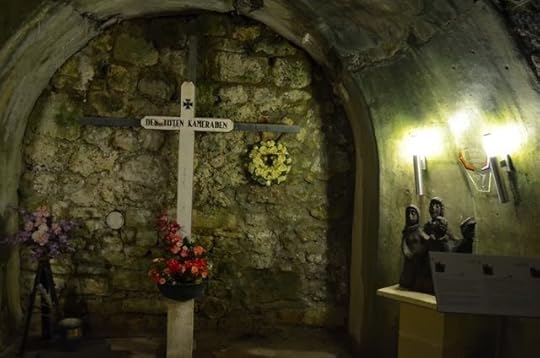
Behind the wall lie the entombed remains of 700 German soldiers who somehow managed to ignite some of the fort’s ordnance and blow themselves up, setting off shells and other explosives. The explosion not only killed those in the corridor, but sent a wall of fire through the fort’s infirmary, where the sick and injured were burned to death. Rather than removing the bodies, the Germans opted to turn the passage into a tomb. And so it remains.
We went down, down, through dank, dark hallways toward the big 400mm gun, which made the gun at Falouse and Vaux look itsy-bitsy. We also saw the hallway where the Germans entered the fort. When we visited, a lone bat was sleeping there, causing visitors to duck or veer sideways so as not to disturb it.
The wash room was stalagmite city, certainly not a place I’d want to wash anything.
But at this point all I could concentrate on was keeping myself from shouting at Benjamin to quit narrating and just get us the hell out of there. It was utterly irrational, but that’s how I felt.
The French eventually retook Douaument, reclaiming in six hours what it had taken the Germans six months to take. The Germans left behind their dead, as well as carvings on some of the tiles and writing in German on the walls as they labeled some of the rooms.
The place is haunted, a restless tomb. “Bad juju” doesn’t begin to describe it.
I was so relieved when we left and went back outside into wind-driven sleet. We went on top the massive fort, looked at the gun turrets, and then I was so cold that Stef took me back to her car, where we waited for Benjamin to finish looking his fill.
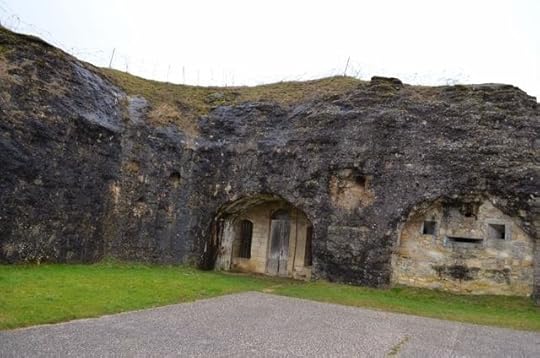
Later, Benjamin and I talked about our shared experience, that sense of dread. We both thought that perhaps it was the last thought of the men who were entombed by the shell explosions or perhaps the last thought of those who saw the wall of fire flying toward them from the site of the explosion.
Then Benjamin suggested that perhaps it was the wish of the 735 people whose remains are still there. Maybe they don’t want to stay inside the fort where they died but wish they’d been removed from this subterranean battleground and buried where sunlight could touch their graves. The 730 German soldiers are so far from home, after all, many of them drafted to fight in a war that wasn’t of their choosing.
How can they rest in peace in Douaumont?
FLEURY
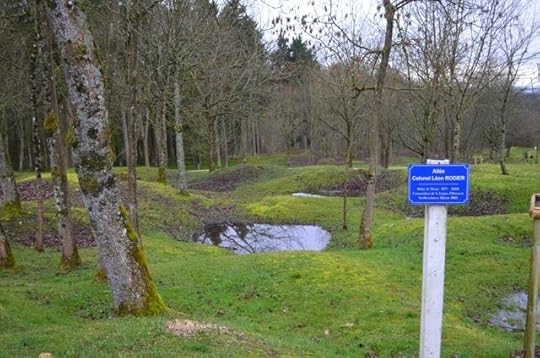
There was once a village called Fleury. It had a café, a church, several small farms, a cemetery, a school. It’s 400 or so residents made their homes on this hillside overlooking Verdun.
Fleury is one of nine villages on the Verdun battlefield that were destroyed and never rebuilt. How can you rebuild something that is a charnel pit of dead bodies, mustard gas canisters and unexploded shells and shell fragments?
Fleury stands near Fort Douaumont, and it was our last stop on our tour of the Verdun battlefields. White markers indicate whose house stood where. This is where the school once was. And this shell hole, now filled with rain water, was a bakery.

The cemetery of Fleury was also destroyed, its coffins blasted out of the earth and shredded during the 16 times the village traded hands between the French and the Germans. Sixteen times. Now, a cross stands in memory of all the departed who were buried and left to rest in peace but whose peace was disturbed.
Fleury still has a mayor. The position is honorary, just as the status of “village” is honorary. The mayor’s job is more or less to see to the upkeep of the memorial to the little village.
France has not forgotten these little destroyed villages. Every year on Nov. 1, the flame from L’Arc de Triomphe in Paris is brought to the Monument a La Victoire in Verdun. On the night of Nov. 10, the flame is carried to Ossuary and also the nine destroyed villages, where it burns overnight and during the day on Nov. 11, the day World War I came to an end, once known as Armistice Day in the US and still called Armistice Day in much of Europe.
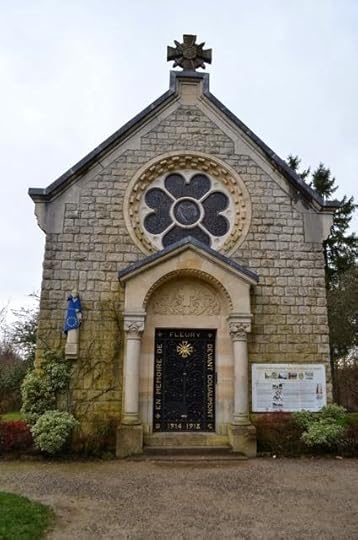
There is a chapel on site, its exterior decorated with an image of Our Lady the Virgin of Europe, an image of Virgin Mary robed in the EU flag — kind of a strange image to be sure, but one intended to focus grief over the loss of the village on the hope that war between the nations of Europe is a thing of the past.
Last time Benjamin was here, he saw a human scapula sitting out in the open. It wasn’t there this time. Perhaps it is now in the Ossuary along with all the other bones found at Fleury.
We walked along the paths, paid a visit to the cross that marked the cemetery, even snapped some photos. Stef took one of Benjamin and me in front of the chapel.

Then it was time for us to get to the train station and return to Paris. Stef drove us there, staying with us while we waited, then saying goodbye.
Overwhelmed by all we’d seen in the past few days — all the death, the terrible stories, the suffering, the crushing losses, the creepifying feeling of Douaument — I didn’t even know how to feel.
What amazed me as we drove away was how few Americans and even French people know anything about World War I and how few actually want to know. But they should know. Just as World War I led to World War II, it is a conflict that is still shaping global events today.
I plan to write about this. What form that will take, I just know that seeing all of this has put something inside me now, and it has to come out.

With many thanks to Benjamin for being my travel companion and sharing his passion and compassion surrounding the Battle of Verdun. Thanks, too, to Mr. Radet for his expertise. And big hugs to Stef for enduring the sleet and the creepiness of Douaument with us.
Published on February 25, 2014 23:22
February 24, 2014
Verdun Battlefield — Day One
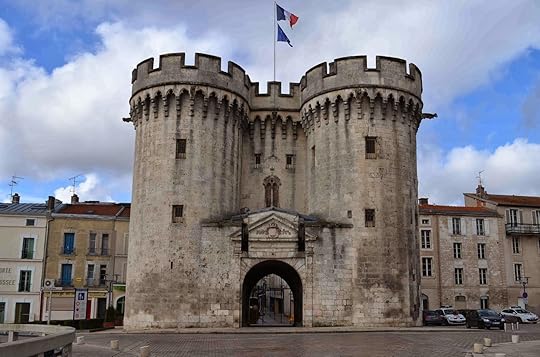
Verdun.
I suppose there are a lot of Americans who’ve never heard of Verdun, and that’s sad. It is the site of one of the most historic defenses in military history, the site of a defeat that helped to derail Germany’s military plans during World War I, and the site of so much human loss that it defies comprehension.
But let me backtrack for just a moment…
I didn’t know much about Verdun until Benjamin, my younger son, who was then 8 years old, became obsessed about the French role in World War I. He watched videos. He read books. He read more books. By the time he was 10, he was reading college-level texts about France in World War I. I would be sitting and writing, and he would walk up to me and begin to describe trench warfare in such detail that he gave me chills.
I put him in French lessons. He took French in school, minoring in the language in college. Thanks to his college French professor and a French government program (funded by French taxpayers), he was invited to serve as an assistant language teacher in the Versailles school district for this school year. I knew he wouldn’t be in France long before he went to Verdun.
He has written a 9,000-word account of his visit, that you can visit here. I won’t attempt to recreate his account. His eloquence and knowledge on this subject dwarf mine. But over the years, I’ve developed an interest in this topic, too, because the stories he’s told of battlefield bravery, human cruelty, and poignant survival have stirred my imagination and made me cry. Truly, he has reduced me to tears at times telling me about things that occurred on the battlefields of Verdun.
A quick historical overview: Germany launched an attack against the stronghold of Verdun on Feb. 21, 1916. The battle lasted 10 horrific months. The German policy was to “bleed the French white,” i.e., to kill as many French as possible in order to win the war.
But karma had a lesson in store for Germany (a lesson it sadly forgot). Yes, they killed lots of French soldiers. But for every Frenchman they slew, one of their own was lost. At the end of those 10 horrific months, Germany had lost as many of its sons as the French. Some 700,000 men were dead — that’s 70,000 a month — while more than a million were wounded.
Verdun as a city was mostly destroyed, and the land surrounding it was absolutely devastated, as millions upon millions of shells had landed, blowing apart the forests, turning the land into a landscape of shell craters, human bones, rotting corpses, and mud.
I knew I had to see this place, to feel it, so to speak. We made plans to visit it long before I got on the plane to France.
Our visit seemed like it was going to be hugely disappointing, as the tour buses to the battlefields do not run during this time of year. We hadn’t realized that and were somewhat surprised, as Feb. 21 marked the 98th anniversary of the beginning of the battle, an event that is usually marked by a ceremony. However, this year’s events were muted as most people are saving up their pomp and circumstance for the 100thanniversary in 2016.
As luck would have it, the woman who runs the hotel front desk at Hotel Les Colombes in the evening and on weekends knows a man who is an expert on World War I. A life-long resident of Verdun, Frédéric Radet is also an expert on the forts, having purchased Ouvrage de la Falouse, one of the smaller forts that was part of the massive fortifications of Verdun, and restored it, turning it into a kind of World War I museum. He is also an author on the architecture of these forts. A quick call to Mr. Radet resulted in his agreeing to drive us around and answer our questions in exchange for a very reasonable daily fee.
We were cranked.
This blog post will cover our first day of touring the battlefield with visits to Ouvrage de la Falouse, Fort de Vaux, the Ossuary at Douaumont, and Ouvrage de Froideterre.
February 20, 2014
OUVRAGE DE LA FALOUSE

The morning started with clouds and rain and a drive to a place I’d never heard of — Ouvrage de la Falouse. Mr. Radet doesn’t speak or understand English, and I understand a lot of French but speak it very poorly, so Benjamin was the main conduit of communication both directions. Since Benjamin was the one with the questions, I just did my best to understand what was being said and to ask questions when I did not.
Ouvrage de la Falouse remained behind French lines during the Battle of Verdun. It was used as a shelter for French troops when they weren’t serving on the front lines and was part of a massive ring of fortifications built around Verdun after the Franco-Prussian War.
The first thing I saw was the barbed wire, one of the symbols of World War I. It was used to ensnare soldiers, who could then be shot down by machine gun fire. At the forts of Verdun, it served that function, helping to keep attacking forces from climbing onto the fort structures.
Here’s the thing about the forts at Verdun: They’re not what you expect. Most of them are subterranean. They’re not like the forts of the American West — wooden pickets surrounding a courtyard. They are heavily fortified bunker forts designed to withstand shell strikes and to cover one another with big guns. Counterscarp bunkers (or counterscarp galleries) enabled soldiers to protect the forts themselves with anti-personnel weapons like grenades or machine guns. They all had big gun turrets, capable of firing shells great distances toward the other ouvrages and forts if/when they came under attack. They are designed to protect soldiers from artillery fire while enabling them to fire back with big, BIG weapons.
Sadly, the French had lost confidence in their system of forts before the Battle of Verdun and had left many of them undermanned and had even removed guns and taken them elsewhere. But we’ll get to that another time. Suffice it to say that it can be costly to learn the right lesson at the wrong time. Or the wrong lesson at the wrong time. Or whatever…
Falouse was behind battle lines. It was not attacked. French and U.S. soldiers stayed at the fort, which has been beautifully reconstructed. Seeing it enabled me to understand and better interpret what I was seeing at the other forts later in the day.
What’s the difference between an ouvrage and a fort? The ouvrages are smaller than the forts, like mini-fort outposts designed to link the bigger forts together. Or that’s my impression of them at any rate.

Mr. Radet and his friends have included mannequins in detailed uniform to help show how people used the fort. We saw reconstructed barracks where soldiers slept four to a bunk , their kits and weapons kept at the ready next to the beds above their heads on a system of shelves and gun racks. We saw the collapsible benches that lined the main hallways, giving soldiers a place to sit as they arrived or prepared to leave in large groups. We saw the duct work that ventilated this large, underground structure and the system of pipes and tanks that held water for washing and cooking. We saw the kitchens, where meals and bread were prepared for 80 men a day. We saw the long lines of phone and telegraph wires strung along the upper right side of the hallways.
There were also latrines. The ones for the enlisted men gave them a place to cop a squat over a hole behind a door. The officers got to sit. No tubs. No showers.
Thinking of human waste, poor ventilation, and lots of sweaty bodies made me wrinkle my nose, but the only smell in Falouse was a vaguely musty scent brought on by the century that has passed — and by the water that leaks through in places.
The captain of the fort had an office near the phone room and the telegraph room. When you know the history of these places the way Mr. Radet and Benjamin do, that means something. Benjamin learned that the heroic commander of Fort Vaux, Major Raynal, had stayed there for a night, and I thought he might swoon.
Now, it’s important to understand that the conversation during our time with Mr. Radet took place in French. Benjamin translated for me when I needed him to, but I also tried to join in the conversation, straining for French words from my high school French classes. This invariably made Benjamin grin or laugh or shake his head, as I asked things like, “How many soldiers was they feedings here on the every day?”
The highlight of this fort for Benjamin was seeing the intact machine gun turret that he was able to turn. These guns were made to turn and fire where needed, and they were aided by multiple steel observation domes where spotters could sight the enemy and, via telephone, direct fire.
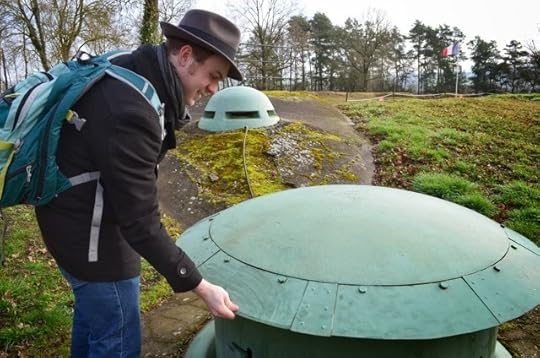
The 75mm gun turret was not movable, but its inner workings were still in place and amazing to see.
Mr. Radet showed us an outdoor latrine, one of the few that still exist from this era. It had something special — graffiti etched by an American soldier from Newark, N.J., who saw fit to scratch his name and town into the metal while doing his business.
FORT DE VAUX
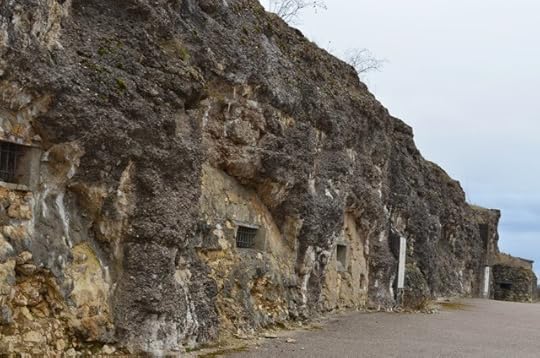
After Falouse, we went to Fort Vaux, which is bigger but almost identical in its construction. Unlike Falouse, Fort Vaux was the site of a fierce battle between French and German forces, and that was evident in the damage around the fort and some damage to the fort. Outside, it looked like a moonscape of craters, the mud now covered with moss and grass.
Fort Vaux had been stripped of some of its guns, so the Germans entered the fort through its counterscarp galleries. But the French did not make it easy for them. After a week of fighting, the Germans had only made it a few meters down the hallway.

Standing near the entrance where the fighting occurred, it wasn’t hard to imagine the rattle of gunfire, men’s shouts, grenade explosions, and piles of dead and dying men as the two forces fought face to face for every inch.
On the walls of all the forts were written something like, “It is better to die and be buried in the rubble than to surrender.”
They continued to fight the Germans, who pumped diesel fumes in through every ventilation port they could find. After a week, the French had run out of water, and soldiers began to lick the walls, trying to drink the condensation on the whitewashed walls.
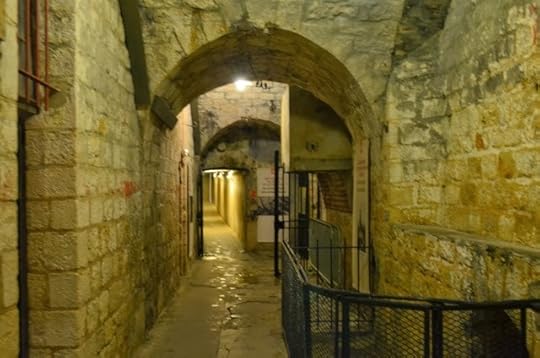
Raynal, the fort’s commander, had been sending pigeons back to inform the French command of his dire situation. Eventually, he was down to one remaining pigeon. He wrote a desperate message, updating his commanders and pleading for aid.
“This is my last pigeon,” he wrote.
But aid did not come in time.
The men who licked the walls began to die, their tongues swelling in their mouths due to the chemical makeup of the lime-based whitewash. And Raynal knew he had no choice but to surrender.
Had his fort had a machine gun turret, had it had all the guns it was built to carry, it would have been able to fend off this attack. However, those weapons were not in place, and he had no choice to but to yield.
As the story goes, the Germans were impressed with his and his soldiers’ valiant defense of Vaux and gave them full military honors.
And that last pigeon?
Sadly, it was gassed. But it flew its little heart out, arriving back at The Citadel in Verdun before it collapsed and died, its message intact. It was named Valiant and given a medal.
Hearing of young men so desperate for water that they licked the filthy walls of the fort and then died as they suffocated from their tongues swelling breaks my heart. But thinking that little bird suffering due to human depravity — gas is one of the most barbaric weapons ever devised — flying its little heart out just to get home, not knowing it was caught in a war, not knowing anything but that it was in pain and wanted to be home, always makes me cry.
They stuffed Valiant and put him in a museum.
THE OSSUARY

At the end of the Battle of Verdun, the French were faced with a landscape of death. The “red zone,” the battle fields, were a charnel pit of unidentified corpses, human bones, unexploded ordnance, destroyed villages, and shell craters. Nine villages had been utterly destroyed, their cemeteries blown sky high, mingling those long dead with those dead for a few months, weeks, days.
The land was unfit to farm, and so the French let the forest reclaim it. As you drive along the roads that cut through the battlefields, you can see millions of shell craters in the shade of tall trees. Rainwater collects in craters, as do fallen leaves. Moss grows on the trunks and on the ground. Everything is green, peaceful, quiet.
Standing guard over this landscape, is the Ossuary at Douaumont. It was built to resemble a sword thrust to its hilt in the earth. The sword’s handle is the tower, and its hilt is a long silent chamber with a chapel and dozens of alcoves, each representing a region or battle in the overall Battle of Verdun.

The walls are covered with names, 4,000 names of soldiers whose families paid to remember them, helping to fund the building of the Ossuary. Each alcove has engraved in it the name of a battle/region — Vaux, Douaumonet, Fleury, Côte 304, Morte-Homme and so one. Beneath those names rest marble blocks carved to resemble coffins. It’s a touching display, but not because of what you see. Rather it’s what you know that puts a lump in your throat.
Laid to rest beneath those marble blocks are the jumbled bones of 130,000 thousand unidentified French and German soldiers. Their bones lay strewn upon the land and were gathered and placed in heaps according to the region in which they were found.

In front of the Ossuary, are 16,000 tomb stones of Christian, Muslim and Jewish French soldiers who died in at Verdun whose identities are known.
These 146,000 men are a drop in the bucket of the total killed at Verdun. They represent less than 20 percent of those who perished in this terrible battle, a battle that raged over a very small region of earth. Verdun, in turn, represents a fraction of overall French losses in World War I. Let that sink in for a moment.
There are other cemeteries that hold Verdun’s war dead, some German, some French, but none so large as the Ossuary and the national cemetery that stands before it. So where are the rest of the dead? Where are the rest of Verdun’s slain?
The French government estimates that at least 10,000 bodies lie beneath the mud at La Côte du Mort-Homme, a place we planned to visit. When shells fell, they sent up huge sprays of mud and dirt, giving thousands upon thousands of dead unceremonious battlefield burials. They also liquefied and pulverized bodies.
Walking on battlefields at Verdun means walking on the dead.
Periodically, a bone appears, freed from the mud by rain. It’s placed in the Ossuary with the others.
Men fought this war to end all wars. They lived in hope in the unendurable conditions of the trenches that no one would have to suffer what they were suffering. And when their bones were placed in the Ossuary, one word was inscribed above the structure’s wide front door: PAX.
Peace.
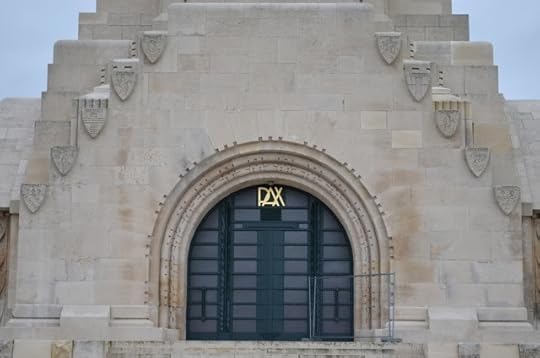
World War II came quickly enough to prove that the war to end all wars had become the seed of continued conflict.
That alone is heart-breaking to me.
You can ponder the fact that French and German dead lie together. You can look through the exterior windows into the crypts that hold the bones and see what 130,000 dead men’s bones look like when their skeletons fall apart. You can imagine the heartbreak of families who never knew how or where their sons, fathers, husbands, brothers, and uncles died. You can try to grasp the pain of dying by shrapnel or mustard gas or enfilading machine-gun fire. You can try to imagine the soldiers’ daily fear.
But mostly I found myself grieving for the waste of human lives.
Once Germany invaded, France was right to defend herself. But in the days before the war, so many different decisions could have been made that might have spared these men and given us all a very different 20thcentury.
We lit candles at the Ossuary for the dead of Vaux, Fleury and other sites. It was so cold inside, I could see my breath. But somehow the cold seemed appropriate for a monument that offers a resting place to the bones of the unknown.

The inside of the Ossuary is inscribed with words that praise heroes, but the windows that look inside the crypts from outside the Ossuary tell us that in war time, human life is cheap.
To me, the words “Support our troops” mean sending soldiers to war only when it is truly necessary, which is not necessarily when our politicians tell us it is necessary. Once World War I had begun, it was necessary to win it. But before it began…
We have so much to learn about making peace.
OUVRAGE DE FROIDETERRE
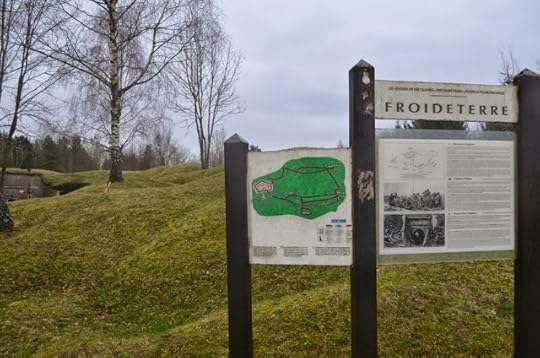 After the sobering experience of Froideterre, we drove the short distance to Fort Douaumont, the biggest fort on our tour. Capable of providing shelter to 800 men, it had a turret with a 400mm gun — a huge weapon. We were turned away by a grumpy, sour-faced woman who told us that 45 minutes wasn’t enough for us to complete the tour and discouraged us from entering.
After the sobering experience of Froideterre, we drove the short distance to Fort Douaumont, the biggest fort on our tour. Capable of providing shelter to 800 men, it had a turret with a 400mm gun — a huge weapon. We were turned away by a grumpy, sour-faced woman who told us that 45 minutes wasn’t enough for us to complete the tour and discouraged us from entering.Mr. Radet took us to a nearby site I’d never heard of, one that is not open, much less open to the public — Ouvrage Froideterre.
Ouvrage Froideterre was similar to Ouvrage de la Falouse in its layout, purpose, and construction. But it differed from the other site in three important respects: It was attacked by the Germans and was the site of a French victory and it has not been restored. (There are other differences, as well, but I won’t go into detail.)
We arrived in the rain and took a tour of the top section of the ouvrage, where Mr. Radet told the story of the German attack. They’d shelled the fort, creating a hole in the roof. When they began to swarm it, the machine gun turret that might have repelled them was useless, as a chunk of concrete had gotten wedged into the turret, preventing it from turning toward the attackers.
German soldiers tried to force their way into through the breach in the roof using flame throwers, grenades, and weapons fire. The commander did not have contact with the machine gun nest on the other side of the courtyard, nor could he contact the big 75 mm gun, so he asked for a volunteer.

The volunteer was ordered to run the length of the courtyard — that would be like running out your front door when there’s an army with flame throwers and rifles on your roof — and run to the machine gun nest and order them to blow the German’s to bits. Somehow, this brave soul managed to carry out this command.
The machine gunners, alerted to the situation, turned their weapons on the fort’s roof and began firing. Behind them, the soldiers manning the 75mm gun saw what was happening and began firing shrapnel-loaded shells designed to cut down the attackers without destroying the already damaged fort.
It worked, and the Germans were repulsed, their drive toward Verdun cut short at Froideterre. A French force soon arrived and drove them farther back behind their lines, halting their progress altogether. And the day was saved.

Interestingly, when the Nazis occupied France, they burned that 75mm gun but not the rest of the fort. I wonder if someone remembered what had happened there.
After telling us this story, Mr. Radet pulled out a flashlight and invited us to explore the unlighted interior of Froideterre with him. In my head I was thinking, “He has got to be kidding! No. WAY!” But he wasn’t kidding.
I took hold of Benjamin’s arm and stepped into the dank, musty interior. It was pitch black. PITCH black. Mr. Radet was clearly familiar with the layout and confidently moved ahead of us, the light of his little flashlight of no use to our eyes. He showed us the place inside the fort where the roof had collapsed and the French had been forced to face flamethrowers to keep the Germans out. The whitewashed wall is gone there, and raw concrete is exposed and blackened.

I thought, “OK, we must be done.” But no. He really wanted to lead us through the place. We walked further, and seeing a little door that opened to the outside, I saw my chance.
“I’m staying here,” I said. I crawled into that little alcove and stayed put, while the light from the flashlight and Mr. Radet’s voice and Benjamin’s faded away. I snapped a few photos of that front hallway, shooting in the pitch black with a flash, and was very grateful when the men returned and we were able to exit and go to the car.
Dark underground places? SO not my thing.
By then I was chilled to the bone and emotionally drained and was eager to get back to the hotel for some dinner. Mr. Radet took us to his house, showed some artifacts and books, including one he wrote, to Benjamin, and the two spoke at length.
In an hour, we were delivered to the doorstep of our hotel. In the span of about eight hours we had covered the ground where some hundreds of thousands of men had died.
We went to bed early because the next day would be even tougher. We hadn’t come to Verdun on these days by coincidence. Feb. 21, 2014, marked the 98th anniversary of the beginning of the battle, and we had a pilgrimage to make.
We were going to the place the battle began — Bois des Caures.
Published on February 24, 2014 05:06
February 20, 2014
A book signing in Paris

Paris.
The name of the city conjures up more than a thousand years of history and culture. Arguably the cultural heart of the wold — “the cultural heart of the universe,” as one Parisian said — it is kind of a mythical place to artists of all kinds. To have a book signing in Paris...
On Feb. 15, I had the amazing good fortune to sign books at Café Bibliothéque at the François Mitterrand Library in Paris. The signing was put together by a small group of wonderful people, especially Karen Harroch of Au Boudoir Ecarlate, who worked in conjunction with the wonderful staff of my French publisher, J’ai Lu, and Fabiola Chenet and Les Romantique.
The experience was amazing. In my imagination, I somehow managed to brush up on French in time to answer all questions en français. Alas, although my linguistic skills were a disappointment, the event itself was not. The room was filled with wonderful people who asked interesting and fun questions. Bridget Costedoat, my new BFF from Great Britain, translated the questions I couldn’t understand or hear and then translated my answers.

So many of the French readers I’ve met on Facebook were there. It was a special privilege to meet them in person, to hear their voices, shake their hands, exchange bisous, to see their smiles. There were a handful of I-Team members present, as well, and we posed together for our own special photo.
It might surprise most American readers to know that the French love my historicals especially. The I-Team series is only now being released there, so many French readers haven’t read any of the stories.
I ended up signing books and bookmarks as fast as I could for more two hours until it was time to leave and was able to have photos taken with many of my reader friends.

It was extra special to have Benjamin there. He ended up having what looked like a lively and fun conversation with the wonderful women from J’ai Lu.
I wore my grandmother’s wedding ring to the signing. A talented student, she’d won some kind of scholarship to study in France but never got the chance. Her parents fell ill with diphtheria, and then she married and had six kids. She never got to see France, let alone Paris. Wearing her ring felt like having her with me, too.
Merci beaucoup, Karen! Merci, J’ai Lu! Merci, Fabiola!
And thank you, Paris, for giving me such a warm welcome and a wonderful memory.
Published on February 20, 2014 13:39
February 13, 2014
A day with J'ai Lu

The trip of a lifetime has begun!
I’m sitting here in a dorm room with my window open to let in a beautiful, cool breeze on a day when half of the US is buried in snow. And I’m not missing home one tiny bit!
I arrived in France on Tuesday at noon. Bridget and Rhiana met me at the airport and drove me through Paris to Corbeil Essonnes, where I’m staying with my younger son, Benjamin. I was exhausted, but not as bad off as I had imagined.
Wednesday we hit the ground running. Benjamin didn’t have to teach, so we accepted an invitation to meet with the staff at J’ai Lu, my French publisher, part of the Flammarion publishing group here in France. It’s a connection I’ve wanted to make for a very long time.
I love languages, and I’m not a huge fan of borders. I love the connection with other cultures that happens when you simply reach out. That’s one reason I have tried to connect as much as I can with readers from around the world. Having direct contact with the publishers who put out my book in translation is a pieces of that. Needless to say, I was thrilled to have the chance to meet the women and men who work hard to get my books out to French readers.
What a wonderful experience it was—far beyond anything I had imagined!
J'ai Lu sent a cab, which drove us to Gare du Lyon in Paris, where we joined the staff members who work on my books for lunch. They all introduced themselves and met Benjamin, and we sat down for a two-hour long meal and conversation that I won’t forget. The food was exquisite, the millefeuille with caramel that I had for dessert blowing my mind.
The restaurant itself was impressive, the decor dating to the Belle Epoch and as ornate and lovely as it could be, with the big train station a minute's walk from our table.
After lunch, we piled into taxis and went to the offices of J’ai Lu, where I got the grand tour and met other staff. It’s an impressive and ambitious operation, and I felt at home there, in part because of my years as a newspaper editor. The people were all very friendly and spoke English for my benefit. Although I can understand spoken French, it’s very hard for me to respond quickly enough to have a real conversation. Benjamin spoke a lot of French with them.
I spoke with the translator who has translated my I-Team stories. Right now, J’ai Lu is hard at work getting Unlawful Contact ready for publication this spring. Its French title translates back to something like “Dangerous Relationship.” They didn't have a cover ready for me to see.
Their marketing people spoke with me for awhile, and I think we’re going to coordinate more than we have on social media and such.
They also explained that my historical romances are so popular there because historical fiction is one of J’ai Lu’s specialties.
I am so grateful to everyone at J’ai Lu for the unforgettable afternoon. Even if I can’t remember everyone’s names — that was a lot of people to meet all at once — I do remember their faces and their smiles and kind words.
When we had a moment alone, Benjamin told me that the experience had blown his mind. “My mom is a celebrity in France,” he said, with a hint of “whoa!” in his voice.
I’m not sure I’d go that far. But I know for a fact that my books, each one of which is precious to me, are in excellent hands here in France.
And, wow, that just gave a whole new meaning to business lunch!
This Saturday is the big book signing and reader event in Paris, and I am so excited to meet my French readers face to face at last!
Published on February 13, 2014 07:53
January 27, 2014
Annual I-Team “Favorites” Poll Results

Every year in the I-Team Facebook group, we have our "Favorite" polls. Here are the results of this year's polls.
Favorite Hero — JULIAN DARCANGELO
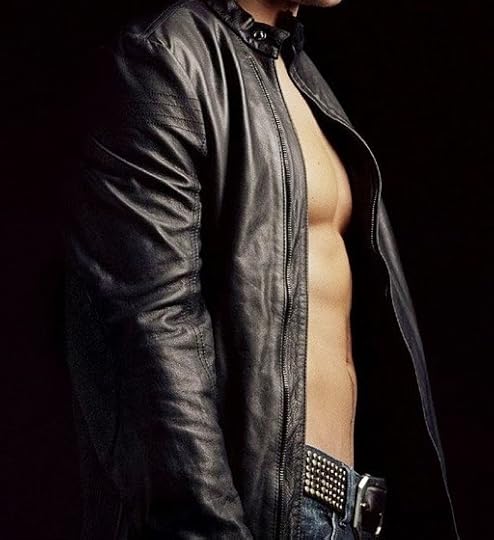
We’ve had major upset. For the first time since we started doing these polls, Marc Hunter (Unlawful Contact) did not win. He was beaten by a margin of three votes by Julian Darcangelo (Hard Evidence). Zach McBride (Breaking Point) got a fair number of votes to come in third, with Gabe Rossiter (Naked Edge) coming in fourth. The rest lagged significantly, with Javier Corbray (Striking Distance), garnering only 10 votes and coming in behind Reece Sheridan (Extreme Exposure) and Nate (Skin Deep).
Finally, Julian gets his due!
Favorite I-Team Heroine — NATALIE BENOIT
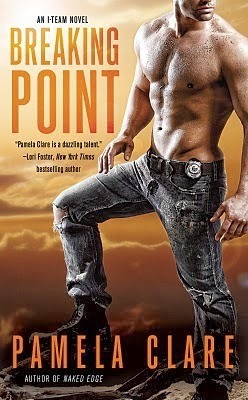
It’s Natalie Benoit (Breaking Point) by a landslide, followed by Sophie Alton (Unlawful Contact), Tessa Novak (Hard Evidence), Laura Nilsson (Striking Distance), Megan Hunter (Skin Deep), Kat James (Naked Edge) and, in last place, Kara McMillan (Extreme Exposure).
Favorite I-Team Couple — MARC & SOPHIE

Marc and Sophie (Unlawful Contact) are the big winners, followed by Julian and Tessa (Hard Evidence) in second place, and Zach and Natalie (Breaking Point) in third. Kat and Gabe (Naked Edge) came in fourth, with Reece and Kara (Extreme Exposure) in fifth and Laura and Javier (Striking Distance) in sixth, Megan and Nate came in seventh (Skin Deep), and Lissy and Will (Heaven Can't Wait) eighth.
However, there was some general agreement that the official favorite couple of the I-Team series is a character known as “Marcangelo.”
Favorite Sex Scene — ZACH AND NATALIE IN THE DESERT AT THE WATERFALL

The winner pants down is Zach and Natalie’s love scene under the waterfall (Breaking Point), followed closely by Marc and Sophie’s first sex scene after he’s out of prison (Unlawful Contact). In third place, is Nate and Megan’s first love scene when she kisses his burns (Skin Deep). Other notable mentions were Reece and Kara’s threesome with Mr. Jiggle Stick; Julian and his “sucky-swirly” trick and little strip tease; and Kat and Gabe making “snow angels.”
Favorite I-Team story — UNLAWFUL CONTACT

Unlawful Contact wins this year, with Hard Evidence in second place and Breaking Point in third. After that it’s Naked Edge, Extreme Exposure, Striking Distance, and Skin Deep. Novella Heaven Can’t Wait came in last.
Favorite Wrenching I-Team moment — GABE’S DEATH SCENE

Gabe’s death scene in Naked Edge won by a landslide, followed by the climax in Breaking Point where Zach flatlines. Marc’s death scene in Unlawful Contact tied for third with Laura’s final decision regarding Klara in Striking Distance. The ending of First Strike when Javier gets the news about Laura is fourth.
Funniest I-Team Moment — CONNOR AND THE JIGGLE STICK

The winner is Connor showing Reece Kara’s “jiggle stick” in Extreme Exposure, followed by a tie between Javier’s quip about Marc and Julian being married in Striking Distance and Marc’s used of “Dickangelo” and “Dorkangelo” for Julian. Fourth Place goes to Kara talking with Reece while drunk in the bar in Extreme Exposure and fifth to Javier walking in naked while Laura was on Skype with her mother and grandmother in Striking Distance.
Categories we might add next year: Sweetest Non-Sex Scene and Best Cover.
So what do you think? How would you have voted?
Published on January 27, 2014 08:26



